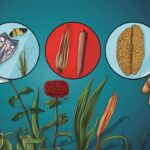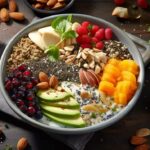Culinary Uses of Chia Seeds
Why Aren’t My Chia Seeds Expanding
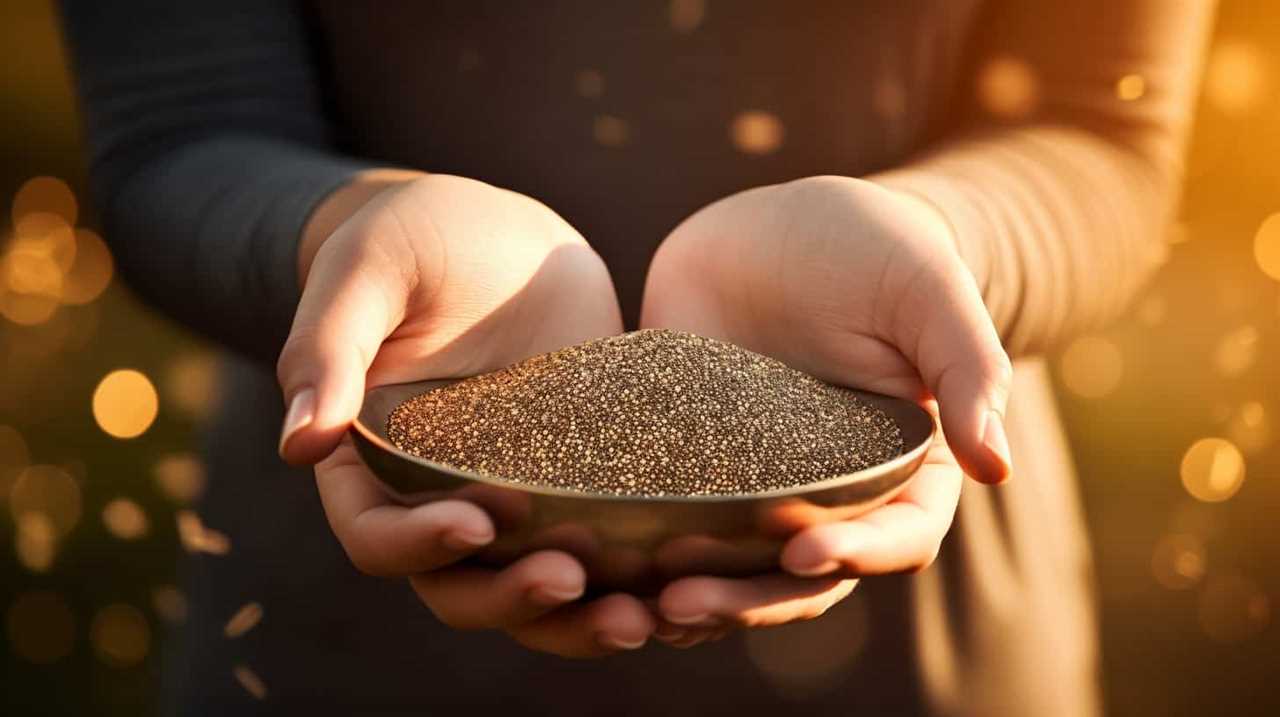
Have you ever thought about why your chia seeds won’t swell up?
We’ve all been there, eagerly awaiting the gel-like consistency that makes chia seeds so unique. But fear not, dear reader, for we are here to shed light on this mystery.
In this article, we will explore the common culprits behind unexpanded chia seeds. From the quality of the seeds to the proper ratio of liquid, we’ll guide you on your quest for perfectly gelatinous chia goodness.
Let’s dive in!
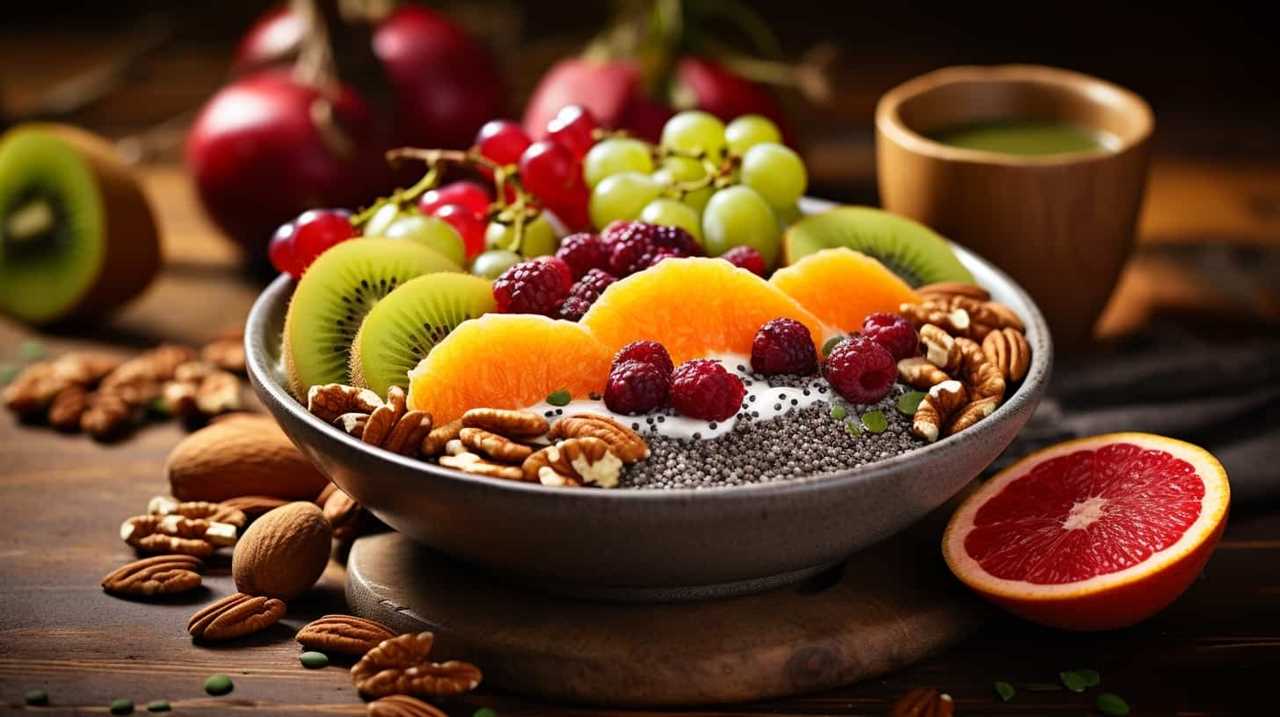
Key Takeaways
- Investing in good quality chia seeds is essential for optimal expansion and enjoying their nutritional benefits.
- Sufficient liquid is necessary for chia seeds to fully expand and avoid a hard and gritty texture.
- Patience is required during the soaking process to allow chia seeds to absorb liquid and reach their optimal consistency.
- Proper storage conditions, including keeping chia seeds in a cool, dry place and sealing them tightly, are crucial for maintaining quality and optimal expansion.
Quality of Chia Seeds
The quality of chia seeds determines their ability to expand when soaked. When selecting chia seeds, it’s important to consider their nutritional benefits and culinary uses.
Chia seeds are packed with essential nutrients such as omega-3 fatty acids, fiber, protein, and antioxidants. These tiny seeds can be beneficial for heart health, digestion, and weight management.
When it comes to culinary uses, chia seeds can be added to smoothies, baked goods, yogurt, and even used as an egg substitute in vegan recipes. However, not all chia seeds are created equal.
It’s crucial to choose high-quality seeds that have been stored properly to ensure optimal expansion when soaked. Inferior quality seeds may not expand as well, resulting in a less satisfying texture and potential digestive issues.
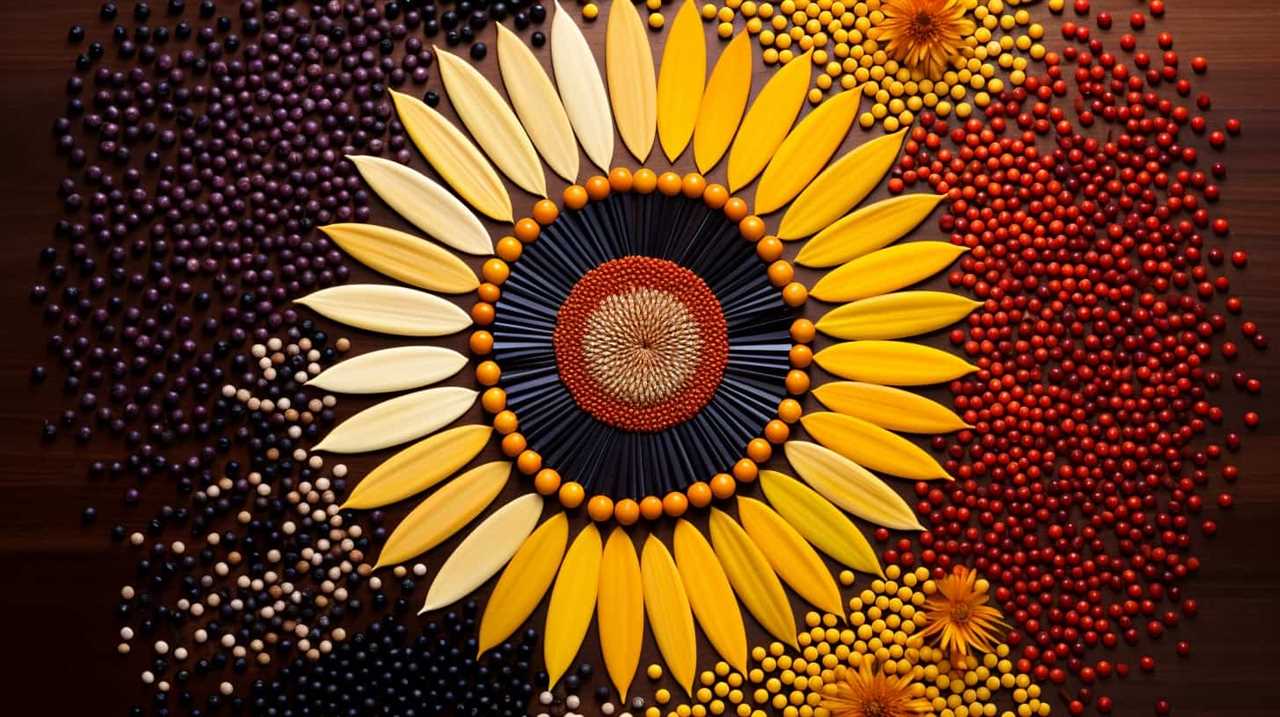
Therefore, investing in good quality chia seeds is essential for enjoying their full nutritional benefits and culinary versatility.
Insufficient Liquid
To ensure proper expansion of chia seeds, it’s important to make sure there’s enough liquid for them to absorb. Chia seeds have the unique ability to absorb liquid and form a gel-like substance, which contributes to their many health benefits. When there’s insufficient liquid, the chia seeds can’t fully expand and may remain hard and gritty.
Adding alternative chia seed recipes, such as chia puddings or smoothies, can increase the liquid content and promote better expansion. Additionally, chia seeds are known for their benefits in digestion. The soluble fiber in chia seeds helps to regulate bowel movements and promote a healthy gut. So, ensuring sufficient liquid for chia seeds to absorb not only aids in their expansion but also enhances their benefits for digestion.
Now, let’s move on to another factor that may hinder the expansion of chia seeds: lack of patience.

Lack of Patience
After ensuring there’s sufficient liquid for chia seeds to absorb, our next consideration is our own patience in allowing them to fully expand. Chia seeds require a certain amount of soaking time to absorb the liquid and reach their full potential. Impatience when waiting for the seeds to expand can be a common mistake. It’s important to remember that chia seeds typically take about 10-15 minutes to fully absorb the liquid and expand. Rushing this process by not giving them enough time may result in the seeds not expanding properly. So, it’s crucial to exercise patience and give the chia seeds the necessary soaking time they need to reach their optimal consistency. By doing so, you’ll be rewarded with fully expanded chia seeds that are ready to be enjoyed.
Moving on to the next consideration, improper storage conditions can also affect the expansion of chia seeds.
Improper Storage Conditions
Additionally, if we don’t store our chia seeds properly, it can hinder their expansion process. Proper storage conditions are crucial for maintaining the quality of chia seeds and ensuring their optimal expansion. Here are some factors to consider when storing chia seeds:
-
Chia seed expiration date: Check the expiration date on the package and make sure to use the seeds before it expires. Expired seeds may not expand properly.
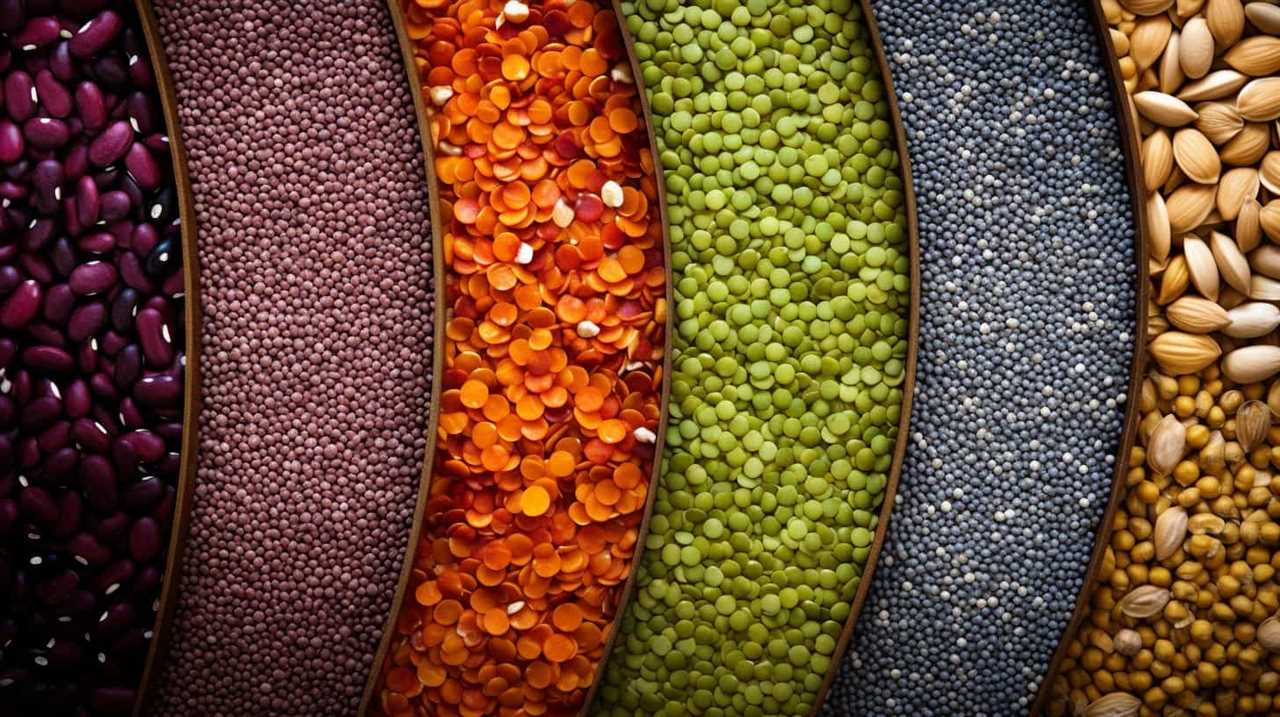
-
Impact of temperature on chia seed expansion: Chia seeds should be stored in a cool, dry place. High temperatures can degrade the quality of the seeds and affect their ability to expand.
-
Avoid exposure to light and moisture: Chia seeds should be stored in airtight containers to protect them from moisture and light. Exposure to light and moisture can lead to spoilage and reduce their expansion potential.
-
Properly seal the packaging: After opening a pack of chia seeds, make sure to reseal it tightly to prevent air and moisture from entering.
Incorrect Chia Seed to Liquid Ratio
Now let’s examine the impact of an incorrect chia seed to liquid ratio on their expansion process.
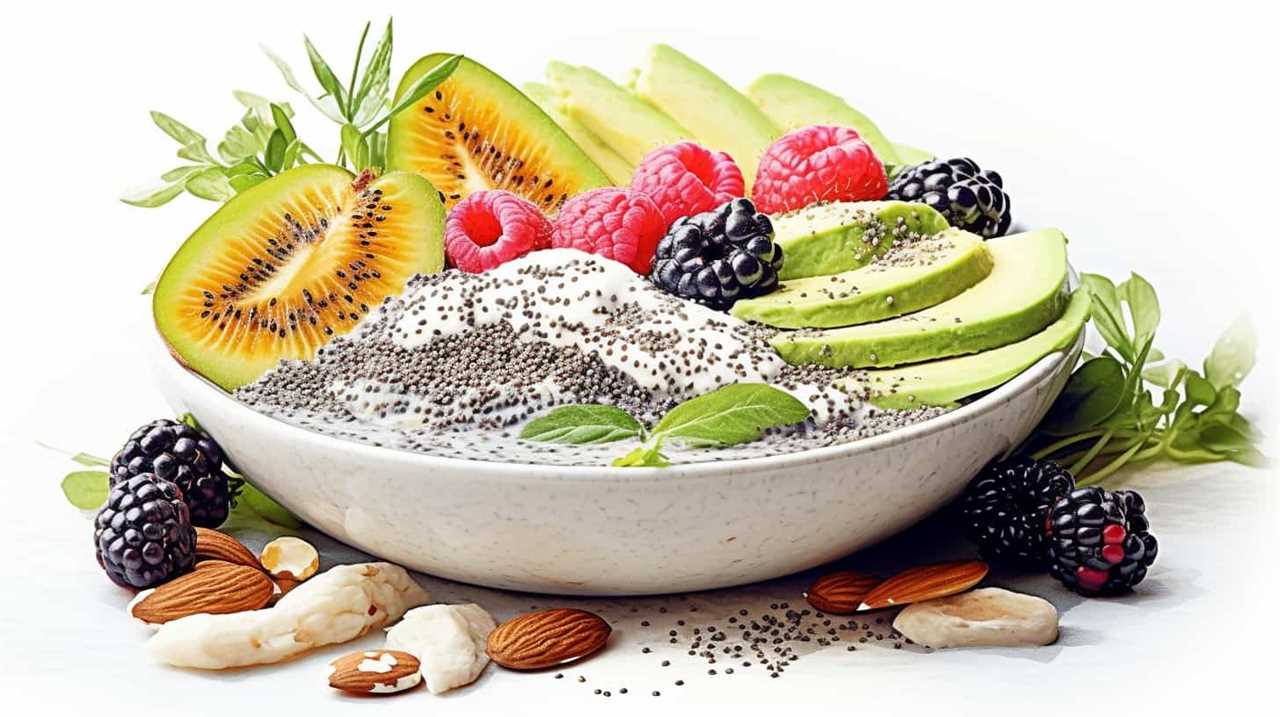
The chia seed benefits are well-known, as they’re packed with nutrients like omega-3 fatty acids, fiber, and antioxidants.
When chia seeds are mixed with liquid, they form a gel-like substance that can be used in various chia seed gel recipes.
However, if the ratio of chia seeds to liquid is off, the seeds may not expand properly.
Too little liquid can result in the seeds clumping together and not absorbing enough moisture, while too much liquid can make the seeds too diluted and prevent them from forming a gel.
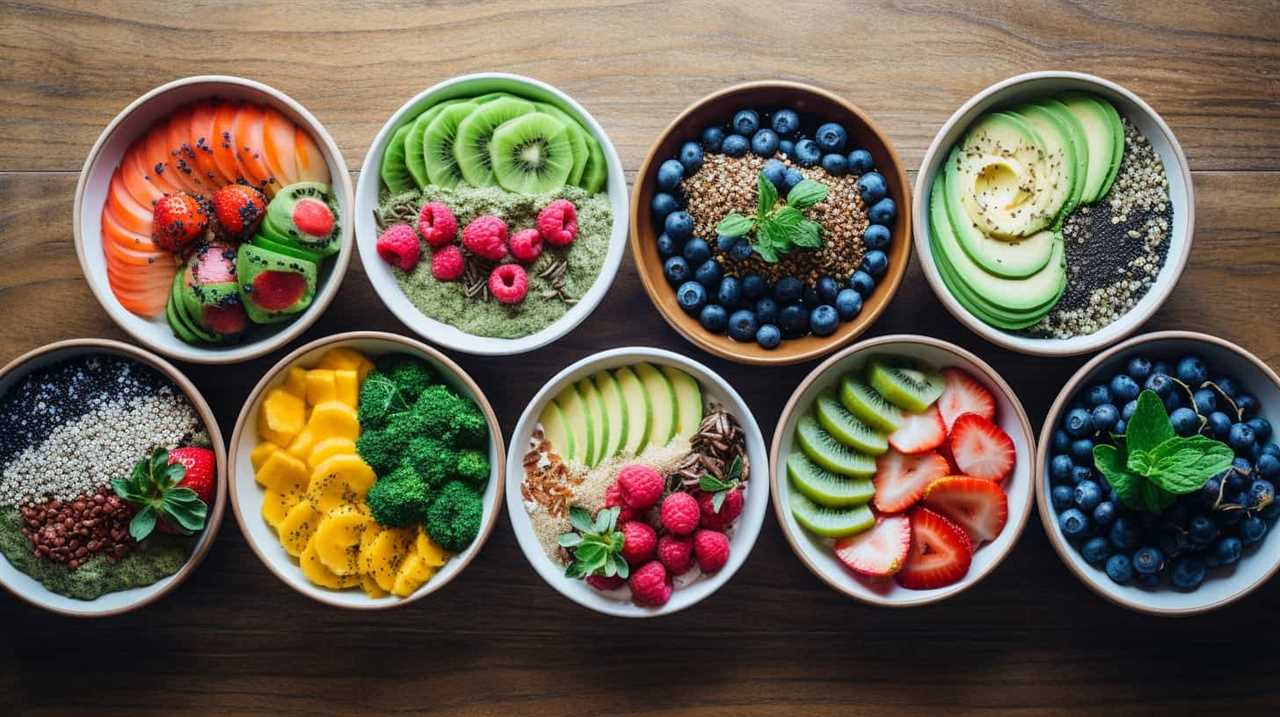
It’s important to follow the recommended ratio, which is typically 1 tablespoon of chia seeds to 3 tablespoons of liquid, to ensure proper expansion and maximize the benefits of chia seeds.
Frequently Asked Questions
Can I Use Chia Seeds That Have Passed Their Expiration Date?
Using expired chia seeds may not yield the desired results. Soaking chia seeds, whether expired or not, can provide various benefits such as increased nutrient absorption and improved digestion.
Can I Use Water Instead of Other Liquids to Hydrate Chia Seeds?
Yes, water can be used to hydrate chia seeds. However, using other liquids like almond milk or coconut water can enhance the flavor and provide additional benefits in chia seed recipes.
How Long Does It Typically Take for Chia Seeds to Expand?
Chia seed soaking time can vary depending on factors like liquid used, temperature, and seed quality. It typically takes around 15-30 minutes for chia seeds to fully expand.
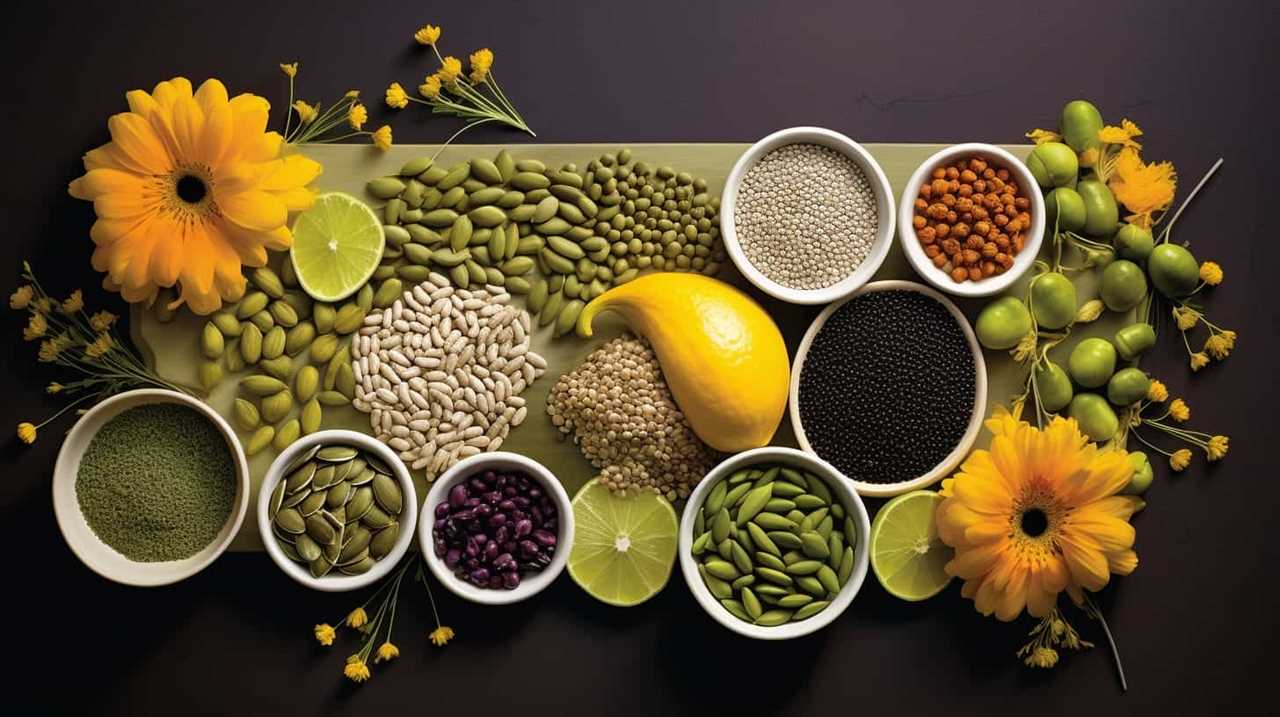
Can I Store Chia Seeds in the Refrigerator to Extend Their Shelf Life?
We can store chia seeds in the refrigerator to extend their shelf life. However, if you prefer alternatives to refrigeration, you can keep them in an airtight container in a cool, dry place.
What Is the Recommended Chia Seed to Liquid Ratio for Optimal Expansion?
When it comes to chia seeds, the ratio of seeds to liquid is important for achieving the desired gel consistency. Experiment with different ratios to find what works best for you.
Conclusion
In conclusion, it seems that the tiny chia seeds may sometimes need a little encouragement to expand. Factors such as the quality of the seeds, sufficient liquid, patience, storage conditions, and the right seed-to-liquid ratio can all play a role.
So, if you find your chia seeds not expanding, take a moment to reassess these elements and give them the gentle nudge they need for delightful expansion.
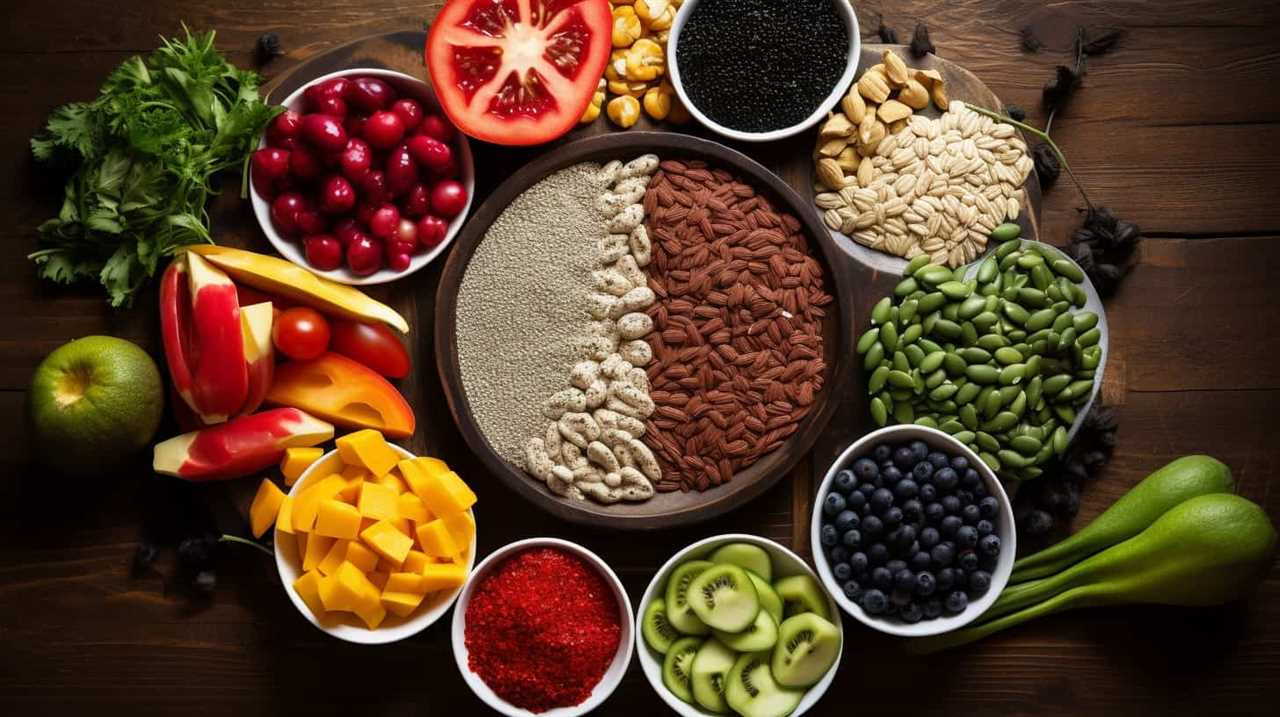
Happy chia seed adventures!
Hi, I’m Sarah. I write for Turtle Tree Seeds, a news blog that loves food – all kinds of food. But especially bacon, chocolate, and veggies. We’re on a mission to show the world that you can enjoy all of those things, even kale and brussels sprouts. Because we believe that when it comes to food, there’s no such thing as guilty pleasures. Just pleasures.
I’m also a huge fan of puns (obviously).
Culinary Uses of Chia Seeds
10 Culinary Tips: Boosting Health With Seed Wonders

Greetings!
Looking to boost your health with some seed wonders? Well, you’re in the right place!
In this article, I’ll be sharing 10 culinary tips that will not only satisfy your taste buds but also provide you with incredible health benefits.
From chia seeds packed with nutrition to using them as a thickening agent or even as an egg substitute, these tips are practical and easy to incorporate into your daily routine.

So, let’s dive in and discover the wonders of seeds together!
Key Takeaways
- Chia seeds are a versatile ingredient that can be incorporated into various recipes to boost their nutritional value.
- Chia seeds can be used in baked goods by replacing some flour with ground chia seeds or mixing them into the granola bar mixture before baking.
- Adding chia seeds to smoothies adds essential nutrients like fiber, protein, and omega-3 fatty acids, and enhances the texture and nutritional content of the smoothie.
- Chia seeds can be used as a thickening agent in recipes such as puddings, soups, sauces, and dressings, providing texture and versatility while offering health benefits like omega-3 fatty acids, fiber, and antioxidants.
Chia Seeds: A Nutritional Powerhouse
As a nutrition enthusiast, I’ve discovered the incredible benefits of chia seeds, a nutritional powerhouse. Chia seeds are packed with nutrients that can greatly contribute to our overall health. They’re an excellent source of fiber, omega-3 fatty acids, and antioxidants.
Incorporating chia seeds into our breakfast dishes is a simple and effective way to boost our nutritional intake. We can sprinkle them on top of yogurt or oatmeal, mix them into smoothies, or even use them as an egg substitute in baking. Chia seeds can also be used to make delicious and nutritious recipes such as chia seed pudding or chia seed overnight oats.
Incorporating Chia Seeds in Baked Goods
To enhance the nutritional value of baked goods, I often incorporate chia seeds. These tiny seeds are a nutritional powerhouse and can provide numerous health benefits when added to your favorite treats. Here are three ways to incorporate chia seeds in baked goods:

-
Chia Seed Pudding: Replace some of the flour in your pudding recipe with ground chia seeds. This won’t only add a delicious nutty flavor, but also boost the fiber and protein content.
-
Chia Seeds in Granola Bars: Mix chia seeds into your granola bar mixture before baking. This will add a satisfying crunch and increase the omega-3 fatty acid content.
-
Chia Seed Coating: Roll your baked goods in a mixture of chia seeds and cinnamon before baking. This will create a flavorful and nutritious crust.
Boosting Smoothies With Chia Seeds
When I boost my smoothies with chia seeds, I notice an immediate improvement in both taste and nutritional value. Chia seeds are a great addition to breakfast bowls as well as yogurt toppings.
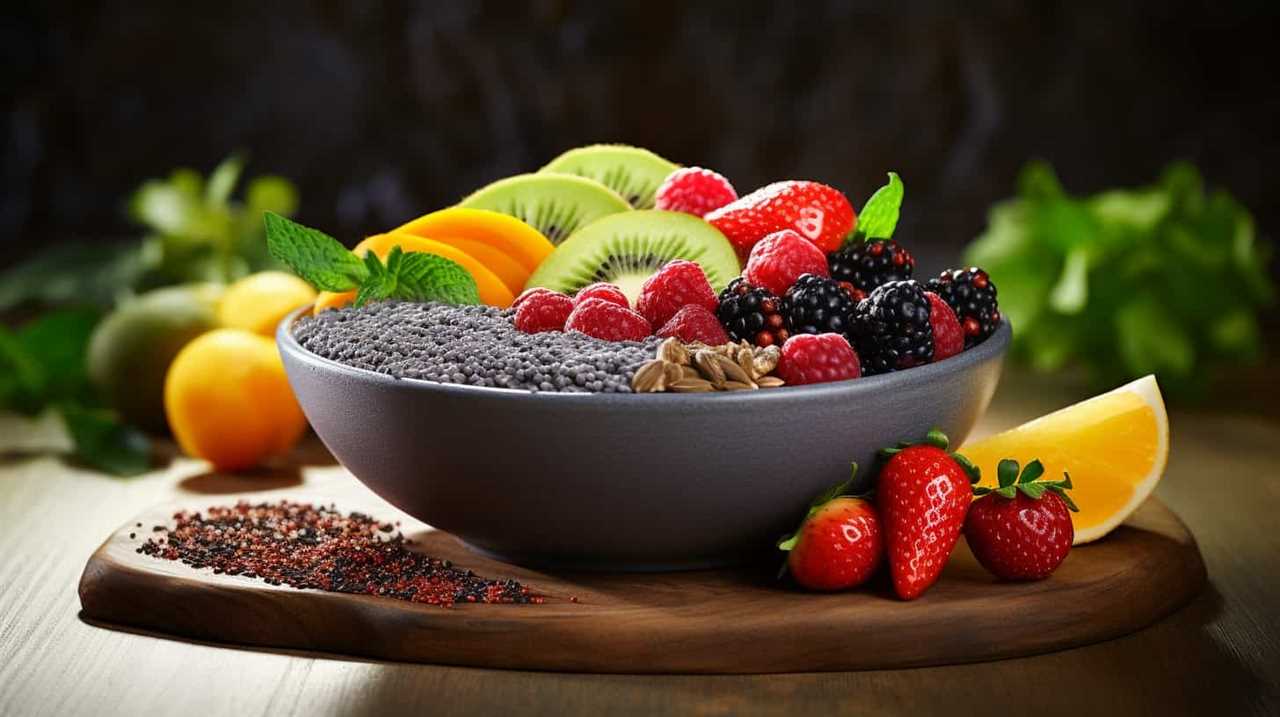
These tiny seeds are packed with essential nutrients such as fiber, protein, and omega-3 fatty acids. They also provide a good amount of antioxidants, vitamins, and minerals.
Adding chia seeds to your smoothies not only enhances the texture but also increases the nutritional content. They absorb liquid and create a gel-like consistency, making your smoothie thicker and more satisfying.
Moreover, chia seeds can help regulate blood sugar levels, promote healthy digestion, and support heart health.
Chia Seeds as a Thickening Agent
I love using chia seeds as a thickening agent in my recipes. Not only do they add a nice texture, but they also have a great versatility that allows them to be used in both sweet and savory dishes.
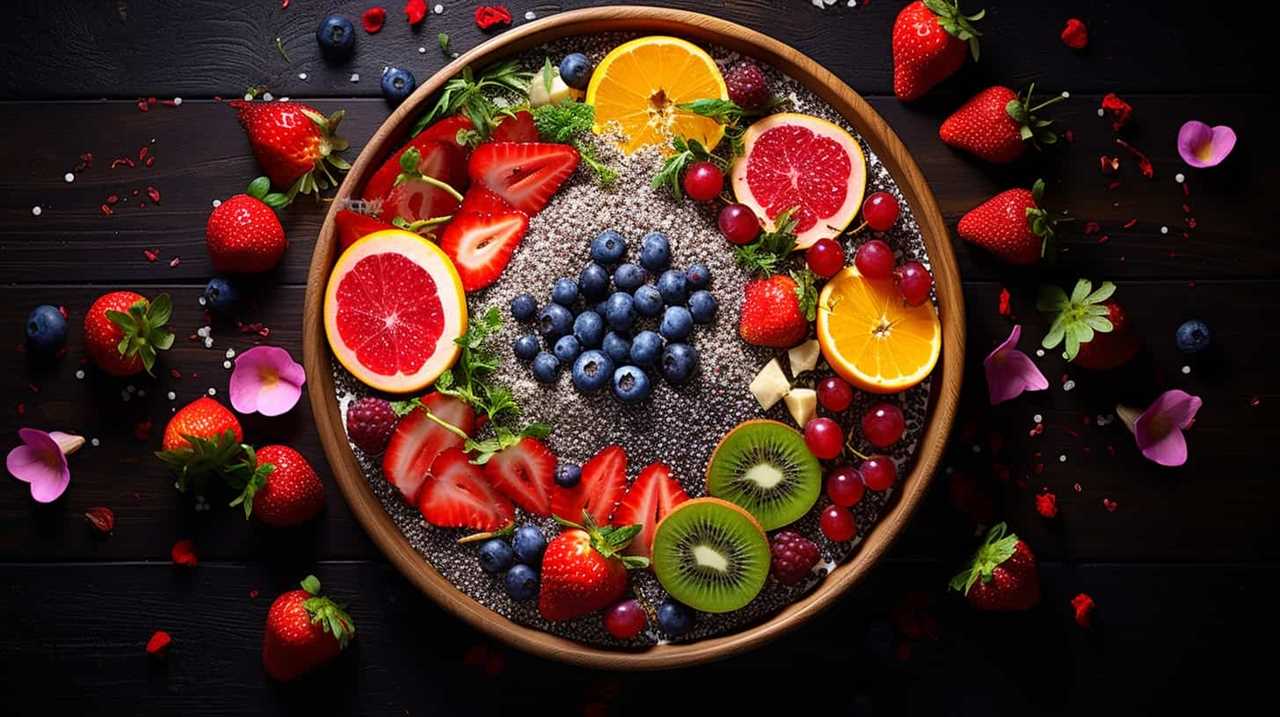
Besides their thickening properties, chia seeds are also packed with health benefits, such as being high in fiber, omega-3 fatty acids, and antioxidants.
Chia for Thickening Recipes
I love using chia seeds as a thickening agent in my recipes. They’re incredibly versatile and can be used in a variety of dishes to achieve a desired consistency.
Here are three ways I incorporate chia seeds into my cooking:
-
Chia for pudding: Chia seeds have a unique ability to absorb liquid and form a gel-like texture. This makes them perfect for creating creamy and satisfying puddings. Simply mix chia seeds with your favorite milk, sweetener, and flavorings, and let it sit in the refrigerator overnight. The result is a delicious and healthy pudding that’s packed with nutrients.

-
Chia seeds in soups: If you’re looking to thicken your soups without using flour or cornstarch, chia seeds are a great alternative. Just add a tablespoon or two of chia seeds to your soup and let it simmer for a few minutes. The seeds will absorb the liquid and help thicken the soup naturally, giving it a hearty and comforting consistency.
-
Chia for sauces and dressings: Chia seeds can also be used to thicken sauces and dressings. Simply whisk them into your favorite sauce or dressing recipe and let it sit for a few minutes. The chia seeds will absorb the excess liquid and create a thicker, more luscious texture.
Versatility of Chia
One can appreciate the versatility of chia seeds as a thickening agent in various culinary creations. Chia seeds have a unique ability to absorb liquid and form a gel-like consistency, making them an excellent natural thickener.
Adding chia seeds to smoothies not only enhances the texture but also provides a nutritional boost. To create a chia seed smoothie, simply blend your favorite fruits, vegetables, and liquid of choice, then stir in a tablespoon of chia seeds. Let it sit for a few minutes to allow the seeds to thicken the mixture.
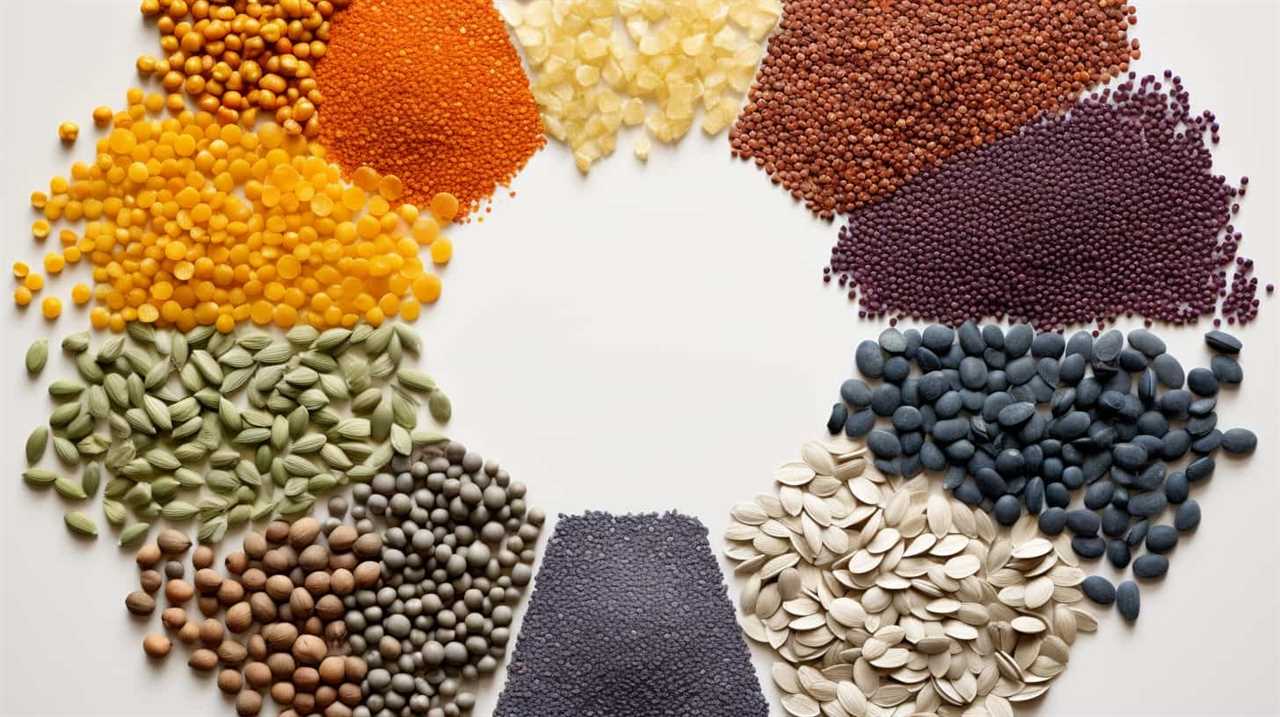
Chia seeds can also be used to create delicious pudding variations. Simply mix chia seeds with your choice of milk, sweetener, and flavorings, and refrigerate overnight for a creamy, indulgent treat.
The possibilities are endless when it comes to incorporating chia seeds as a thickening agent in your culinary creations.
Health Benefits of Chia
The health benefits of chia seeds as a thickening agent can’t be overstated. Chia seeds aren’t only a versatile ingredient in the kitchen, but they also offer numerous health benefits. Here are three reasons why chia seeds are a great addition to your diet:
-
Chia seeds are rich in omega-3 fatty acids, which are essential for brain health and can help reduce inflammation in the body.

-
Chia seeds are packed with fiber, which can aid in digestion and help you feel fuller for longer, making them a great choice for weight loss.
-
Chia seeds are also beneficial for the skin. They contain antioxidants that can help fight free radicals and promote healthy skin.
Incorporating chia seeds into your daily routine can be as simple as adding them to smoothies, oatmeal, or yogurt. These small seeds pack a powerful nutritional punch and can contribute to your overall well-being.
Now let’s explore another way chia seeds can be used in the kitchen – as an egg substitute in recipes.
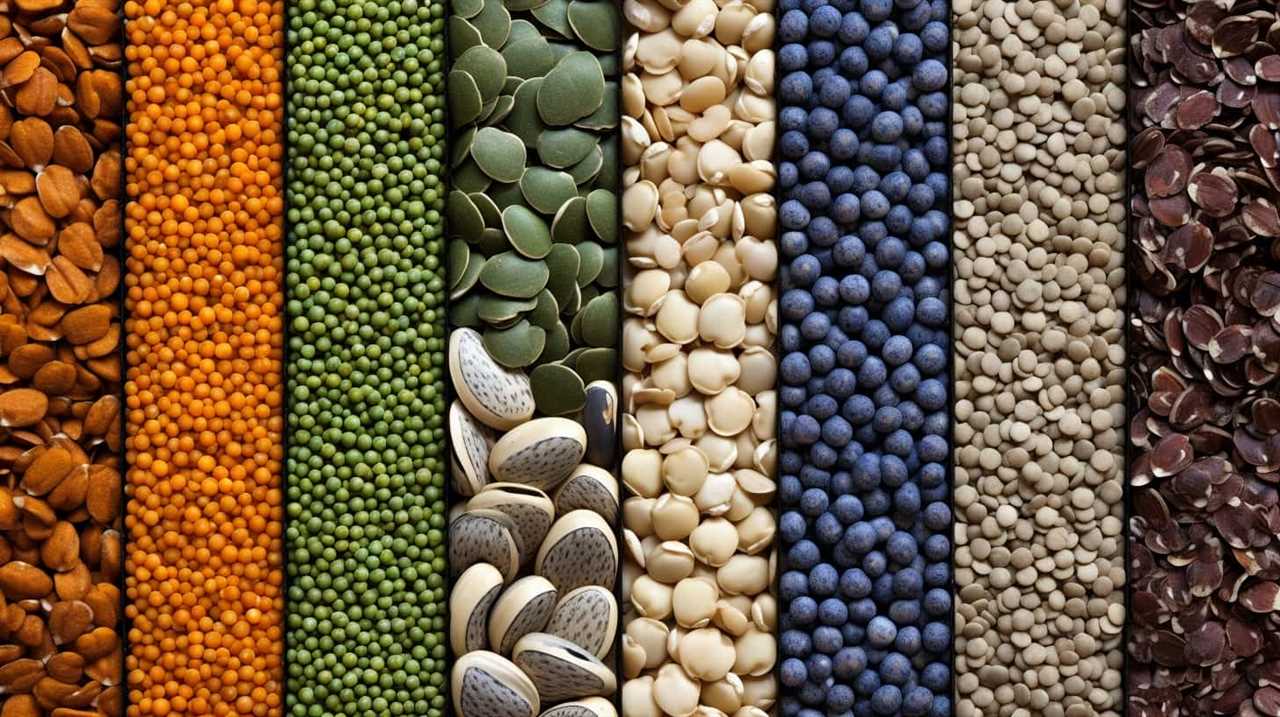
Chia Seeds: An Egg Substitute in Recipes
When it comes to baking, eggs are often used to provide structure, moisture, and binding properties. However, for those following a vegan diet or with egg allergies, chia seeds can be a great alternative.
Chia seeds, when mixed with water, form a gel-like substance that can mimic the texture and binding properties of eggs in recipes. This makes them an excellent option for vegan baking or for anyone looking to reduce their intake of animal products.
Chia Vs. Eggs: Benefits
I’ve discovered the benefits of using chia seeds as an egg substitute in my recipes. Not only are chia seeds a great source of nutrients, but they also offer unique advantages over eggs. Here are three reasons why chia seeds are a fantastic alternative to eggs:
-
Nutritional Comparison: Chia seeds are packed with essential nutrients like fiber, protein, and omega-3 fatty acids. Compared to eggs, chia seeds contain fewer calories and cholesterol, making them a healthier choice.
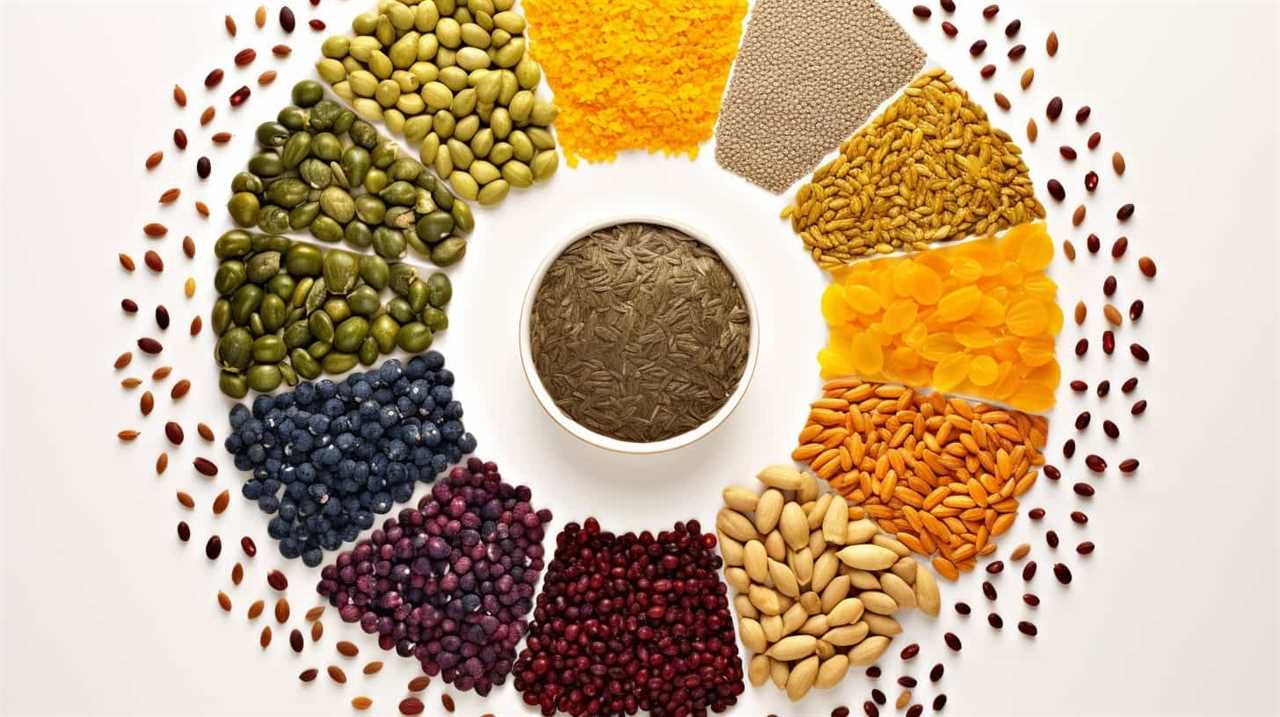
-
Benefits for Weight Loss: Chia seeds are known for their ability to aid in weight loss. They’re high in fiber, which helps promote satiety and prevents overeating. Additionally, the gel-like consistency of soaked chia seeds can make you feel fuller for longer.
-
Versatility in Recipes: Chia seeds can be used as an egg substitute in various recipes, such as baking, smoothies, and puddings. They act as a binding agent and provide moisture, resulting in delicious and nutritious dishes.
Chia for Vegan Baking?
Continuing the exploration of chia seeds as an egg substitute in recipes, let’s delve into the question of whether chia is suitable for vegan baking. Chia seeds not only provide a great alternative for eggs in vegan recipes, but they also offer added nutritional benefits. They are rich in fiber, protein, omega-3 fatty acids, and antioxidants. When soaked in water, chia seeds develop a gel-like consistency, which can mimic the binding properties of eggs in baking. This makes them perfect for creating moist and fluffy vegan desserts.
Here’s a table highlighting some popular uses of chia seeds in vegan baking:
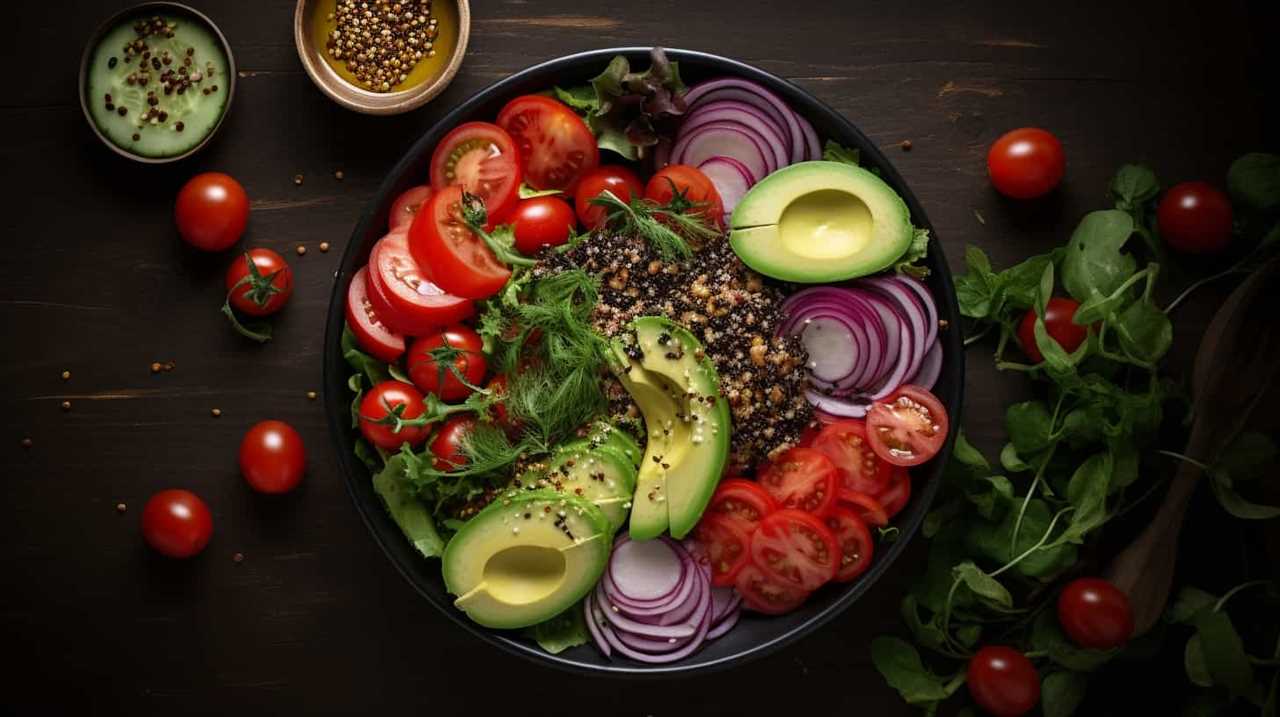
| Vegan Baking | Chia Seeds |
|---|---|
| Gluten-free baking | Chia seeds can be used as a binding agent in gluten-free baking recipes, providing structure and moisture to baked goods. |
| Vegan desserts | Chia seeds can be used as an egg substitute in vegan desserts like cakes, cookies, and muffins, resulting in delicious and satisfying treats. |
Chia Seeds: Adding Texture to Salads
To enhance the texture of salads, I incorporate chia seeds. These tiny seeds pack a big nutritional punch and add a delightful crunch to any salad. Here are three ways I use chia seeds to elevate my salads:
-
Adding crunch to granola: I love sprinkling chia seeds on top of homemade granola for an extra crunch. They add a subtle nutty flavor and a satisfying texture that complements the other ingredients perfectly.
-
Creating unique salad dressings: Chia seeds can also be used to make delicious and nutritious salad dressings. Simply blend them with your favorite ingredients like lemon juice, olive oil, and herbs to create a creamy and flavorful dressing that will take your salad to the next level.
-
Mixing into salad toppings: Another way I incorporate chia seeds into my salads is by mixing them into my favorite toppings. Whether it’s roasted nuts, dried fruits, or even croutons, chia seeds add an extra layer of texture and a boost of nutritional value.
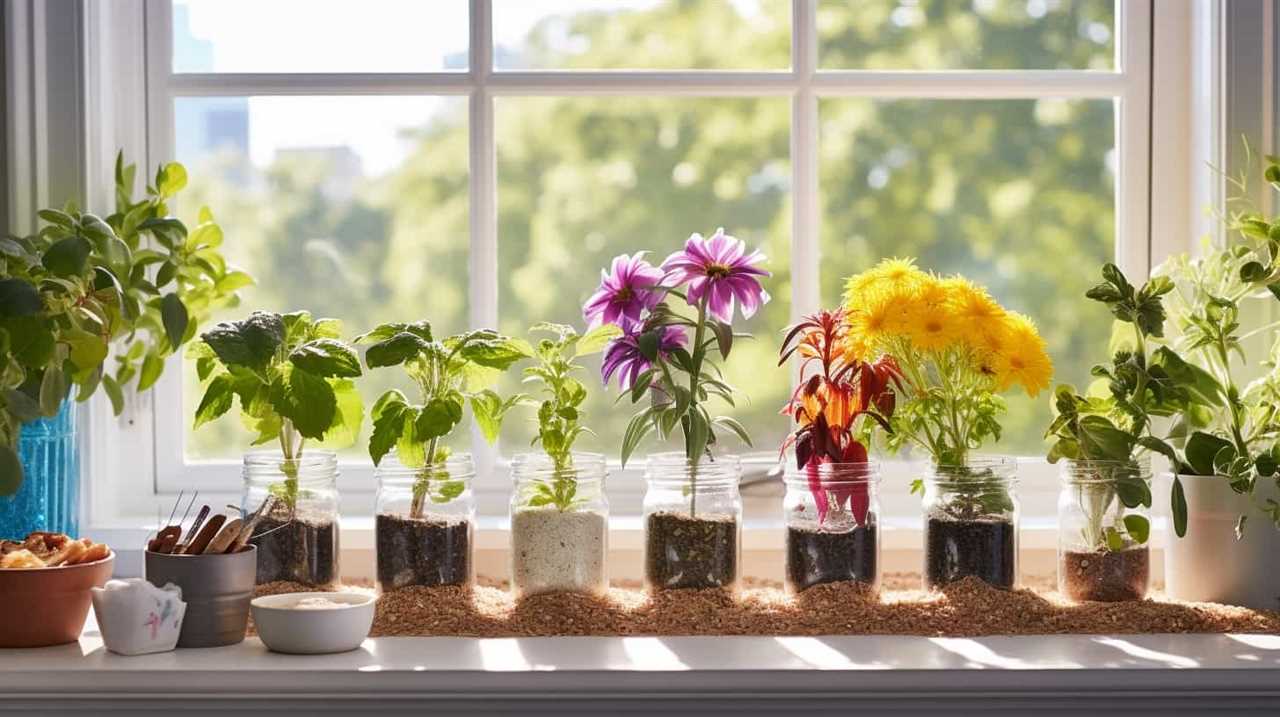
Incorporating chia seeds into salads is an easy and versatile way to add a unique texture and boost the health benefits of your meal.
Chia Seeds in Homemade Energy Bars
I’ve discovered that adding chia seeds to homemade energy bars not only boosts their nutritional value but also adds a delightful crunch.
Chia seeds are packed with fiber, protein, and omega-3 fatty acids, making them an excellent addition to any diet.
Chia Seed Benefits
For boosting health, chia seeds can be incorporated into homemade energy bars. Chia seeds are a nutritional powerhouse, packed with essential nutrients and health benefits. Here are three reasons why you should consider adding chia seeds to your homemade energy bars:
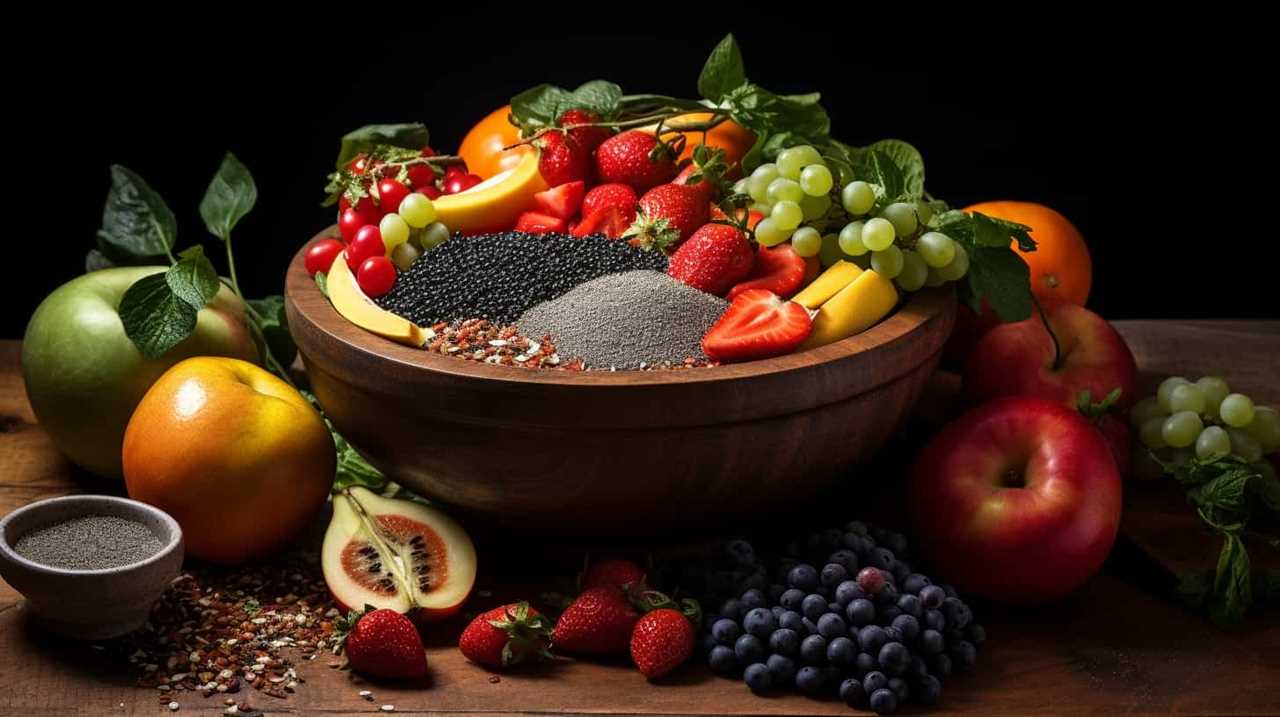
-
Rich in Omega-3 Fatty Acids: Chia seeds contain high levels of omega-3 fatty acids, which are essential for brain health and reducing inflammation in the body. Adding chia seeds to your energy bars can help boost your omega-3 intake and support overall wellness.
-
High in Fiber: Chia seeds are an excellent source of dietary fiber, which is essential for regulating digestion and promoting a healthy gut. By including chia seeds in your energy bars, you can increase your fiber intake and support digestive health.
-
Versatile and Delicious: Chia seeds can be easily incorporated into various recipes, including chia seed pudding and chia seed smoothies. They add a pleasant texture and nutty flavor to your energy bars, making them not only nutritious but also delicious.
Energy Bar Variations
Using chia seeds in my homemade energy bars has been a game-changer for boosting my health and enjoying a nutritious snack. Chia seeds are packed with essential nutrients, including fiber, protein, and omega-3 fatty acids, making them a perfect addition to energy bars.

One of my favorite chia seed recipes for homemade energy bars is a simple combination of dates, nuts, and chia seeds. I blend these ingredients together in a food processor, press the mixture into a pan, and refrigerate until firm. The result is a delicious and satisfying snack that provides me with long-lasting energy.
Not only are homemade energy bars with chia seeds healthier than store-bought options, but they also allow for customization and control over the ingredients used.
Transitioning into the next section, let’s explore the benefits of homemade energy bars compared to store-bought ones.
Homemade Vs Store-Bought
As I continue discussing the benefits of homemade energy bars with chia seeds, it’s important to consider the differences between homemade and store-bought options. When it comes to chia seeds in energy bars, there are a few key factors to consider:

-
Nutritional value comparison: Homemade energy bars allow you to control the ingredients and portion sizes, ensuring that you’re getting the maximum nutritional benefits from the chia seeds. Store-bought options may contain added sugars, preservatives, and other unnecessary ingredients that can diminish the overall nutritional value.
-
Freshness and quality: Homemade energy bars allow you to use fresh, high-quality ingredients, including freshly ground chia seeds. Store-bought options may have a longer shelf life, but the quality and freshness of the ingredients may not be as high.
-
Customization: Homemade energy bars offer the opportunity for customization, allowing you to tailor the bars to your personal taste preferences and dietary needs. Store-bought options may have limited flavor options and may not cater to specific dietary restrictions.
Chia Seeds: A Healthy Binding Agent
Chia seeds are an excellent binding agent for enhancing the nutritional value of recipes. These tiny seeds are packed with omega-3 fatty acids, fiber, and protein, making them a great addition to any meal or snack.

One popular way to incorporate chia seeds into your diet is by making chia seed pudding. Simply mix chia seeds with your choice of milk and sweetener, and let it sit overnight to thicken into a delicious and nutritious pudding.
In addition to their binding properties, chia seeds can also aid in weight loss. The fiber in chia seeds absorbs water and expands in your stomach, helping you feel fuller for longer and reducing your overall calorie intake. They can also help stabilize blood sugar levels, preventing spikes that can lead to cravings and overeating.
Chia Seeds in Savory Dishes
When it comes to incorporating chia seeds into savory dishes, their versatility as a nutritious binding agent knows no bounds. These tiny seeds not only add a delightful crunch but also pack a powerful nutritional punch.
Here are three ways to incorporate chia seeds into your savory dishes:
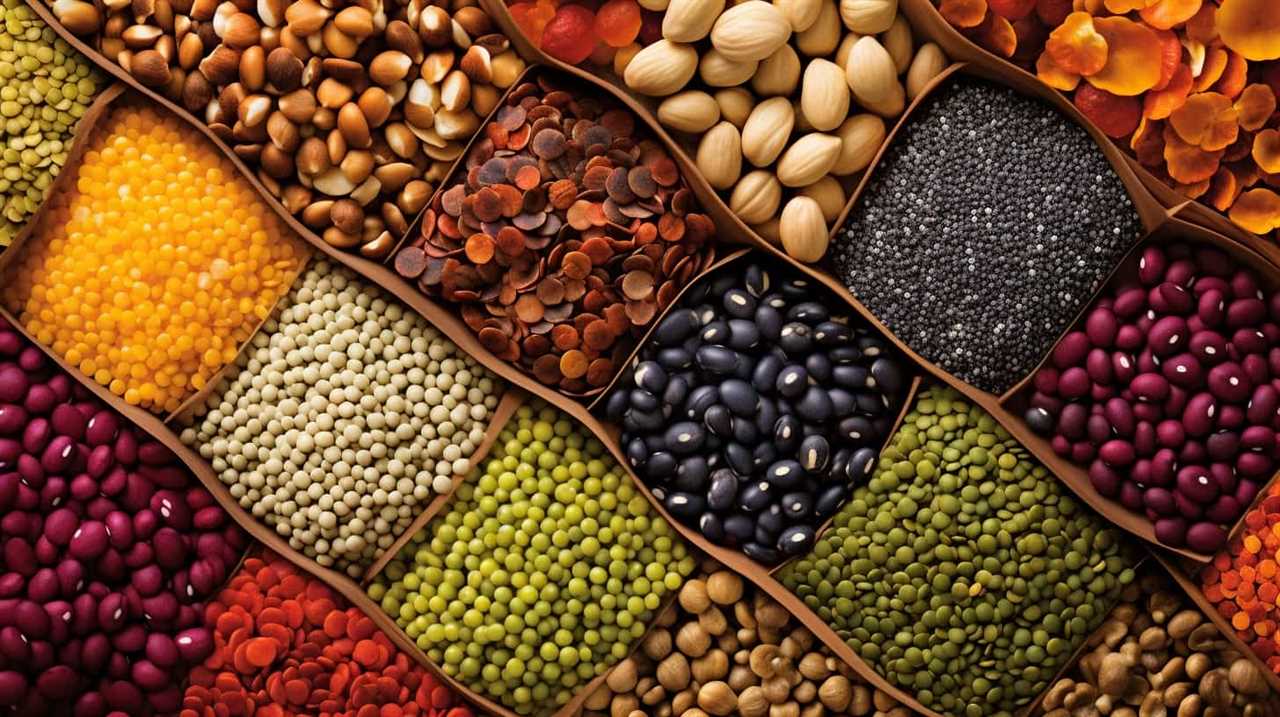
-
Chia seeds in stir fries: Sprinkle chia seeds over your favorite stir fry for an added boost of fiber and omega-3 fatty acids. They’ll absorb the flavors of the dish and add a satisfying texture.
-
Chia seeds in soups: Stir in a tablespoon of chia seeds into your soups to thicken and give them a hearty texture. They also provide a subtle nutty flavor that pairs well with savory broths.
-
Chia seed crusts: Use ground chia seeds as a binder for savory crusts. Whether you’re making a quiche or a veggie pie, chia seeds can replace eggs or breadcrumbs to hold everything together.
With these simple tips, you can elevate the nutritional value of your savory dishes with the addition of chia seeds.
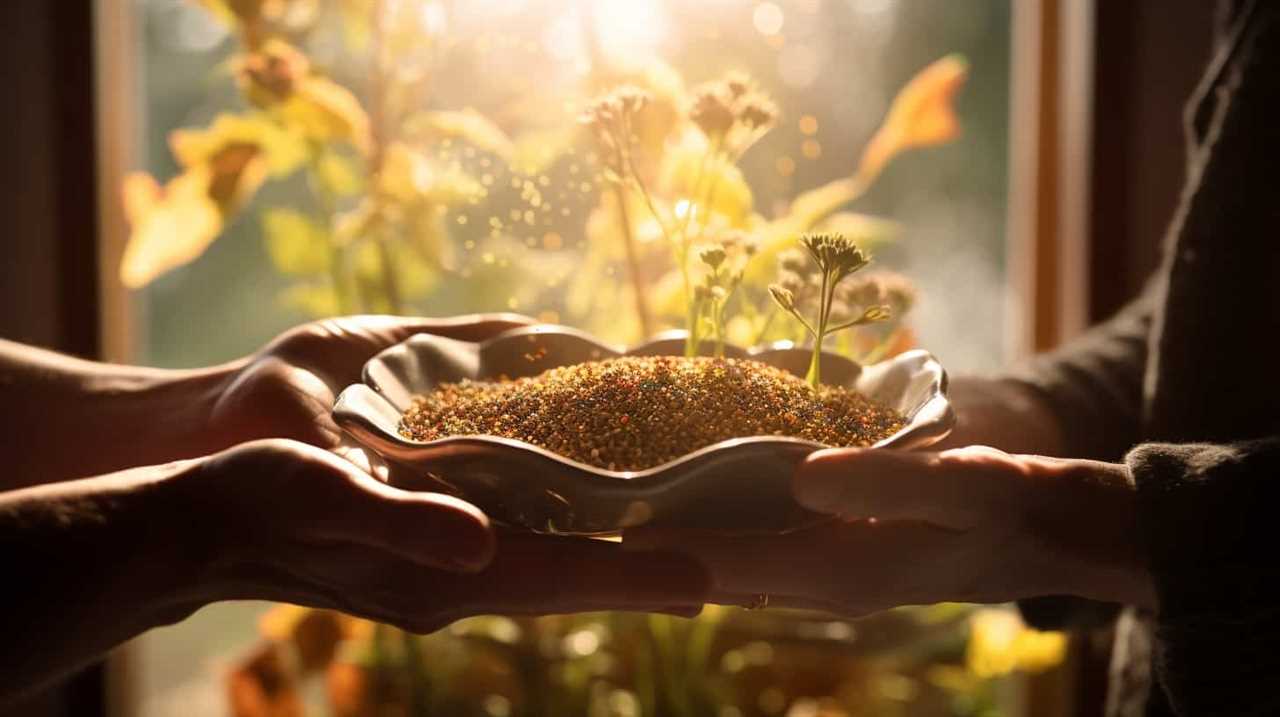
Chia Seeds: Enhancing Hydration in Beverages
I love how chia seeds can enhance the hydration of beverages. When added to smoothies or chia seed pudding, these tiny seeds absorb liquid and create a gel-like consistency. This gel helps to slow down the absorption of water, keeping you hydrated for longer periods.
Chia seeds are hydrophilic, meaning they can absorb up to 10 times their weight in water. This unique property makes them an excellent addition to your favorite drinks.
Not only do chia seeds enhance hydration, but they also provide a boost of nutrients. They’re rich in fiber, omega-3 fatty acids, protein, and antioxidants.
Frequently Asked Questions
How Can Chia Seeds Be Used as an Egg Substitute in Recipes?
Chia seeds can be used as an egg substitute in recipes like chia seed pudding or chia seed pancakes. They create a gel-like consistency when mixed with water, making them a great binding agent.

What Are Some Creative Ways to Incorporate Chia Seeds in Baked Goods?
Incorporating chia seeds in baked goods can be a creative way to boost nutrition. From chia seed desserts to innovative recipes, these tiny wonders add a healthy twist to your favorite treats.
How Can Chia Seeds Be Used as a Thickening Agent in Cooking?
I love using chia seeds as a thickening agent in my cooking. They add a healthy boost to recipes and have many benefits. Techniques like soaking them in liquid or grinding them can create a great texture. Plus, there are alternatives like flaxseeds or gelatin.
Are There Any Specific Types of Savory Dishes That Can Benefit From the Addition of Chia Seeds?
I’ve found that adding chia seeds to savory dishes can really boost their flavor and nutritional value. From salads to stir-fries, these tiny wonders bring a satisfying crunch and a dose of healthy omega-3 fatty acids.
Can Chia Seeds Be Used to Enhance Hydration in Beverages Other Than Smoothies?
Yes, chia seeds can boost hydration in beverages other than smoothies. Adding chia seeds to flavored water or homemade energy drinks can increase their nutritional value and help you stay hydrated throughout the day.
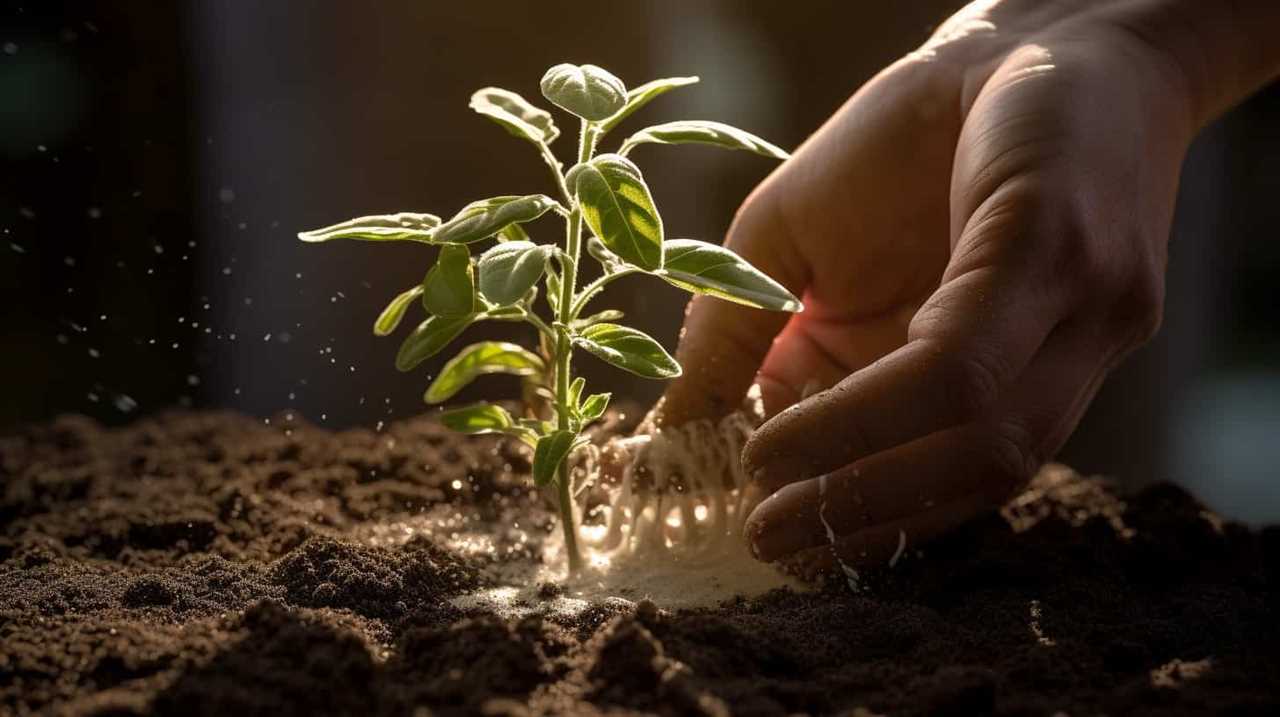
Conclusion
Incorporating chia seeds into your culinary repertoire can be a game-changer for your health. These tiny wonders offer a wealth of nutritional benefits. They provide essential nutrients and omega-3 fatty acids, aid in hydration and energy levels. From boosting smoothies and baked goods to serving as an egg substitute and thickening agent, chia seeds are versatile. So why not add a sprinkle of chia seeds to your next meal and reap the rewards of their incredible health-boosting properties?
Hi, I’m Sarah. I write for Turtle Tree Seeds, a news blog that loves food – all kinds of food. But especially bacon, chocolate, and veggies. We’re on a mission to show the world that you can enjoy all of those things, even kale and brussels sprouts. Because we believe that when it comes to food, there’s no such thing as guilty pleasures. Just pleasures.
I’m also a huge fan of puns (obviously).
Culinary Uses of Chia Seeds
10 Vegetarian Recipes Loved by Top Chefs With Superseed

- What are some alternative ingredients that can be used in these recipes for those with gluten or dairy allergies?
- Are there any specific precautions or considerations to keep in mind when cooking with gluten or dairy substitutes in these recipes?
I have discovered the secret ingredient that top chefs can’t get enough of: superseeds! These tiny but mighty seeds offer incredible health benefits and add a delightful crunch and texture to vegetarian dishes.
In fact, 10 of the most beloved recipes by these culinary masters feature the incredible chia seed. From creamy smoothie bowls to mouthwatering stuffed bell peppers, these dishes will take your taste buds on a delectable journey.
Get ready to experience the magic of chia in every bite.
Key Takeaways
- Chia seeds are a versatile ingredient that can enhance the flavor and nutritional value of vegetarian recipes.
- Avocado-based condiments like mayo add richness and creaminess to dishes, making them a great alternative to traditional mayo for vegetarians.
- Superseeds like chia seeds, hemp seeds, and flax seeds bring nutritional benefits to recipes, such as added fiber, protein, and omega-3 fatty acids.
- Creamy tahini sauce, made from tahini, is a versatile and delicious addition to vegetarian recipes, adding a creamy texture and nutty flavor.
Classic Chia Seed Pudding
As a top chef who loves experimenting with superseeds, I can’t resist sharing my go-to recipe for a classic chia seed pudding. Chia seeds are these tiny powerhouses packed with nutrients, and when combined with liquid, they transform into a luscious, creamy pudding that’s not only delicious but also incredibly good for you.
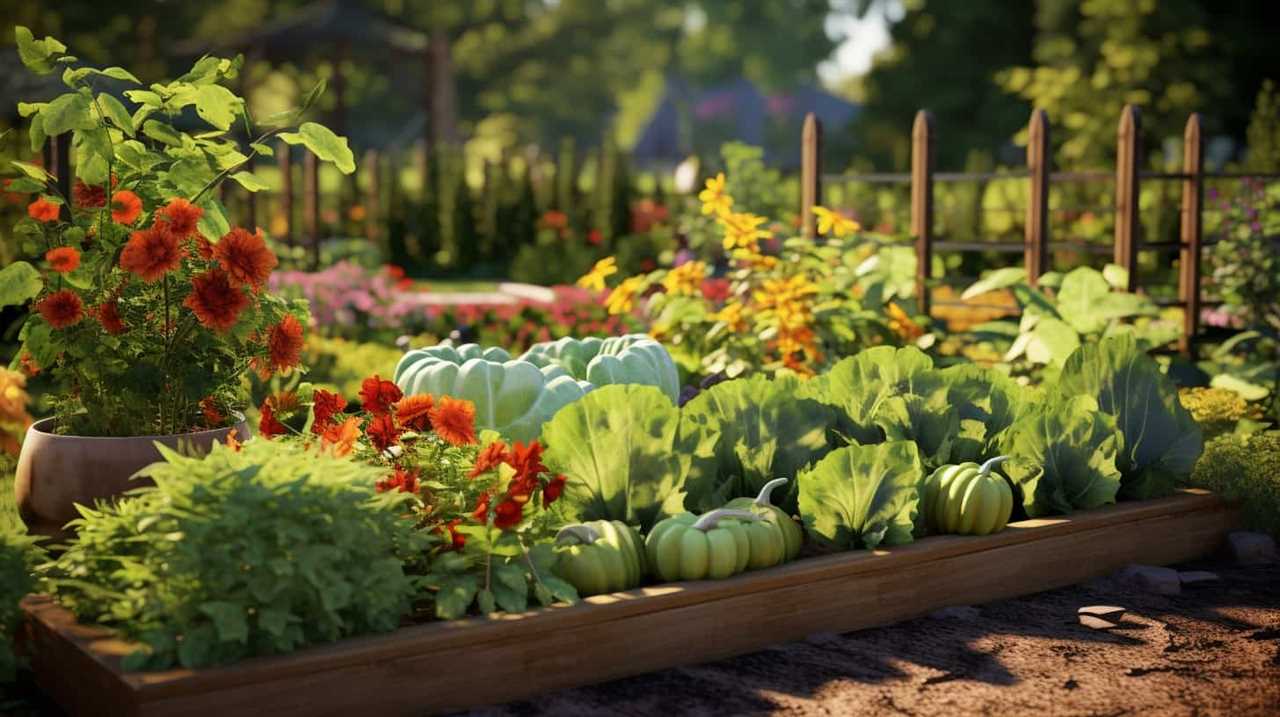
The variations for chia seed pudding are endless, from adding fresh fruits and nuts to incorporating flavors like chocolate or matcha. But no matter how you choose to customize it, one thing remains constant – the health benefits of chia seeds. These little seeds are loaded with fiber, protein, and omega-3 fatty acids, making them a perfect addition to your diet.
Roasted Vegetable Quinoa Salad With Chia Dressing
Now, let’s dive into my personal favorite – a roasted vegetable quinoa salad with a creamy chia dressing.
This dish combines the earthy flavors of roasted vegetables with the protein-packed goodness of quinoa, all topped off with a tangy and nutritious chia dressing.
It’s a perfect option for a light lunch or dinner, and the best part is that you can customize it to your liking. You can switch up the roasted vegetables based on your preferences and what’s in season, creating endless variations of this delicious salad.
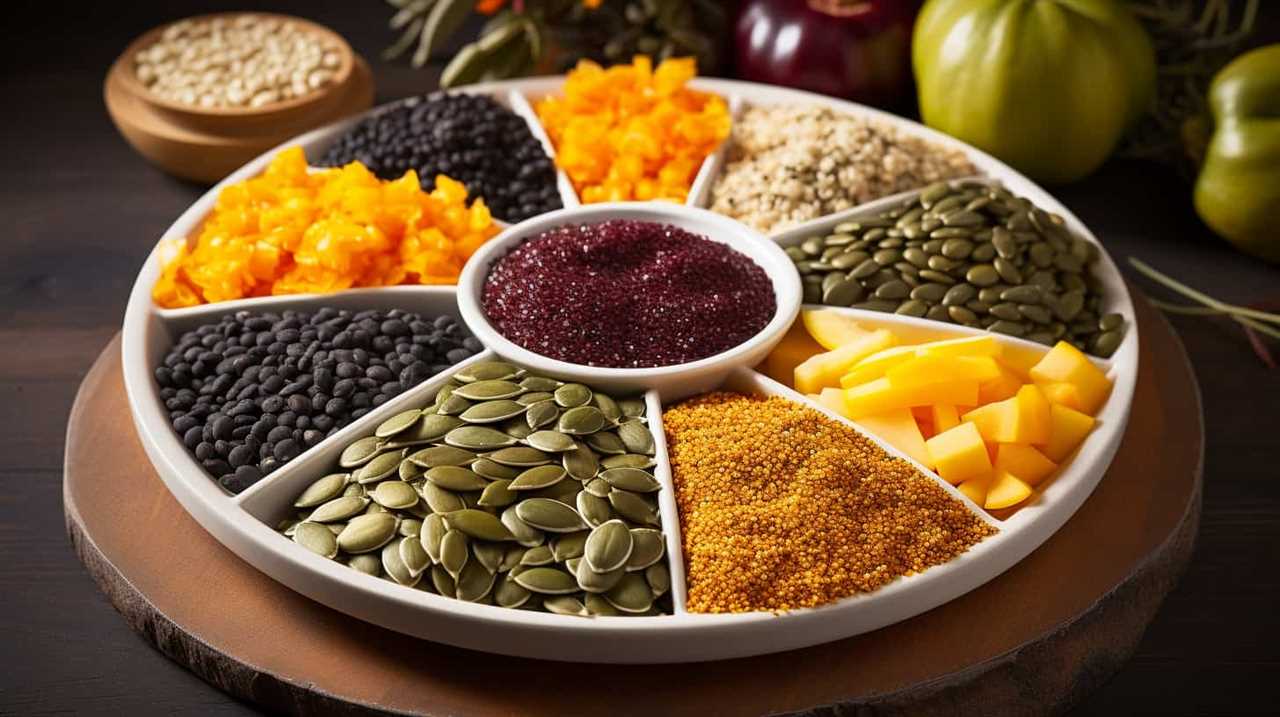
And if you’re not a fan of chia, don’t worry! There are plenty of other alternatives for the dressing, such as a tahini or lemon vinaigrette.
So get creative and enjoy this tasty and wholesome meal.
But if you’re looking for something heartier, the next section will introduce you to a vegan chia burger with avocado mayo.
Vegan Chia Burger With Avocado Mayo
I’ve always been a fan of plant-based burgers. The Vegan Chia Burger with Avocado Mayo sounds like a delicious option. The creamy avocado condiment adds a rich and smooth texture to the burger, making it even more satisfying.
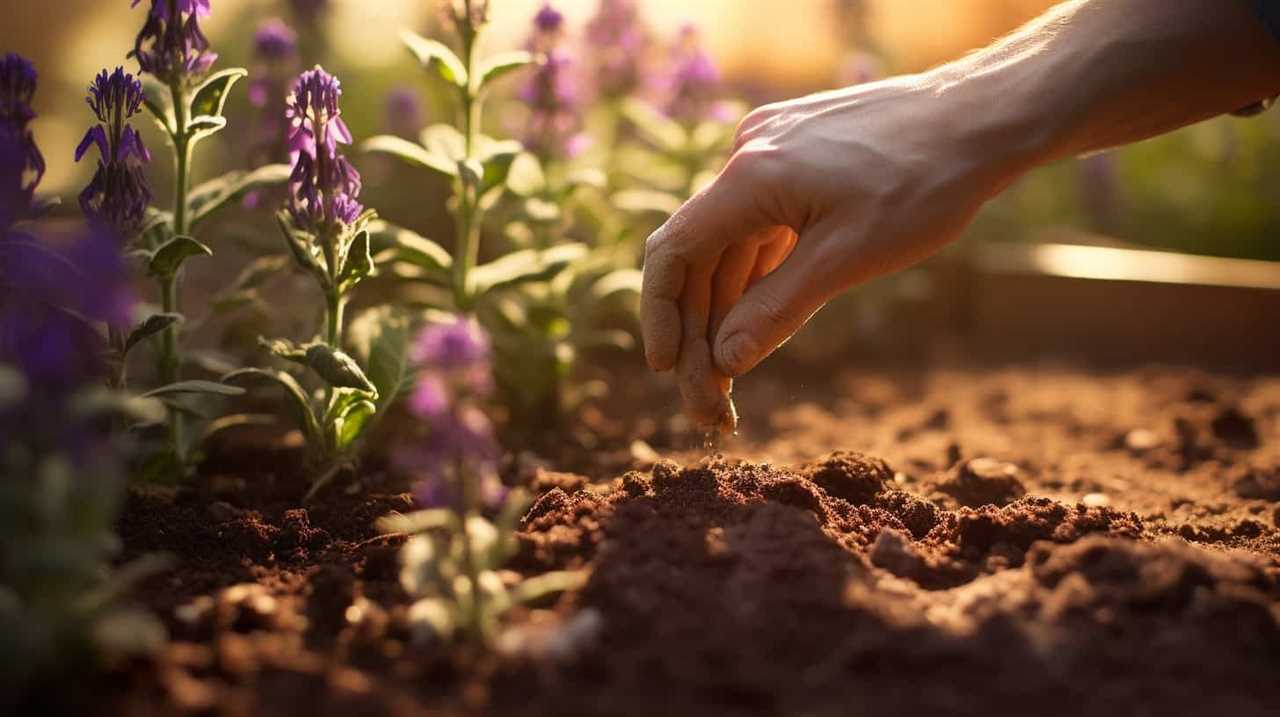
I’m also intrigued by the role of superseeds in this recipe. They provide a nutritious boost and add a unique crunch.
Plant-Based Burger Options
I love the Vegan Chia Burger with Avocado Mayo as a delicious plant-based burger option.
This burger isn’t only packed with protein and fiber from the chia seeds, but it also has a wonderful texture and flavor.
The chia seeds give it a slightly nutty taste and a satisfying crunch.
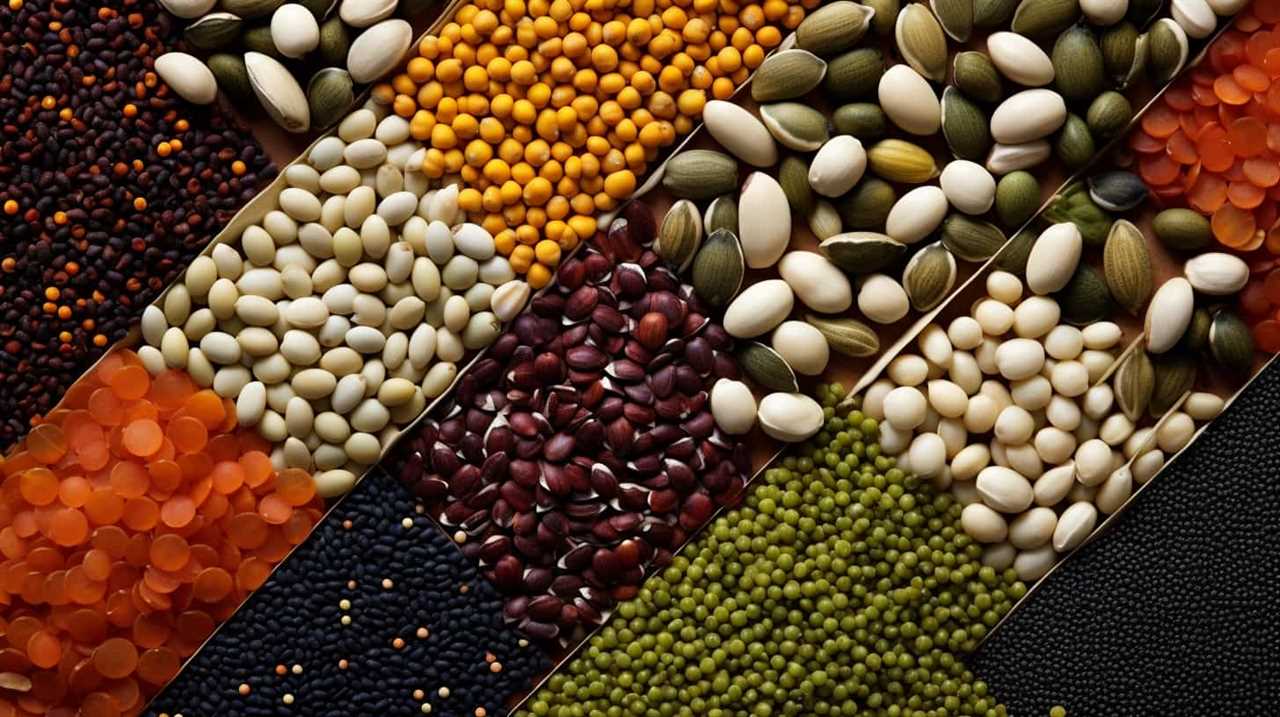
The avocado mayo adds a creamy and tangy element that perfectly complements the burger.
It’s a great alternative for those who are looking for plant-based options without sacrificing taste or texture.
Plus, it’s incredibly easy to make at home.
Simply mix together the chia seeds, vegetables, and spices, form them into patties, and cook them until they’re crispy on the outside and juicy on the inside.
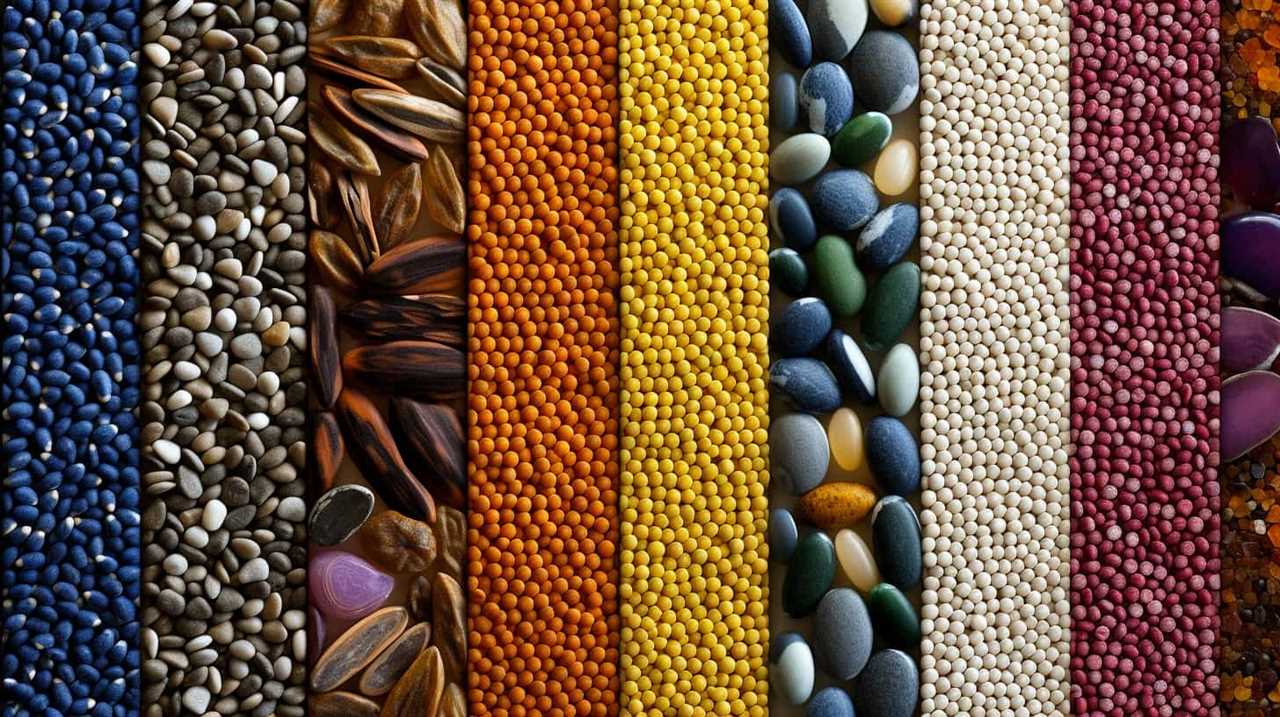
Serve them on a bun with some avocado mayo, lettuce, and tomato, and you’ve got yourself a fantastic plant-based burger that will satisfy even the most dedicated meat-eater.
Creamy Avocado Condiments
Continuing the discussion from the previous subtopic, I find the Creamy Avocado Mayo to be a perfect complement to the Vegan Chia Burger, enhancing its flavor and texture. Avocado-based dips aren’t only incredibly delicious but also packed with nutrients. Here are some reasons why you should try them:
- Creamy and smooth texture that adds richness to any dish.
- Avocado is a great source of healthy fats, promoting heart health.
- It provides a burst of freshness and tanginess to balance out the burger’s savory flavors.
- Avocado mayo is a vegan alternative to traditional mayo, making it suitable for those with dietary restrictions.
- The vibrant green color of the mayo adds a visually appealing element to your plate.
Now, let’s explore the role of superseeds in creating these amazing vegetarian recipes.
Superseed’s Role in Recipes
How can superseeds enhance the flavor and nutritional value of the Vegan Chia Burger with Avocado Mayo? Superseeds play a crucial role in vegetarian cooking, adding both taste and nutrition to everyday meals. In the case of the Vegan Chia Burger with Avocado Mayo, superseeds like chia seeds can be incorporated into the burger patty itself, adding a subtle crunch and a boost of fiber and omega-3 fatty acids. Additionally, a sprinkle of hemp seeds on top of the burger can provide a nutty flavor and extra protein. To showcase the benefits of superseeds in this recipe, here’s a table highlighting the nutritional value they bring:

| Superseed | Nutritional Benefits |
|---|---|
| Chia seeds | High in fiber and omega-3 fatty acids |
| Hemp seeds | Rich in protein and healthy fats |
| Flax seeds | Good source of omega-3 fatty acids |
Chia Seed Energy Bars With Nuts and Dried Fruits
I love chia seed energy bars because they aren’t only delicious but also packed with nutrients.
These bars are a perfect combination of chia seeds, nuts, and dried fruits, providing a satisfying crunch and burst of flavor.
They’re a great option for a quick and convenient snack, and the chia seeds offer numerous health benefits such as omega-3 fatty acids and fiber.
Tasty Chia Seed Combinations
Chia seed energy bars with nuts and dried fruits are a delicious and nutritious combination loved by top chefs. They’re packed with energy, protein, and essential nutrients, making them a perfect snack for any time of the day.
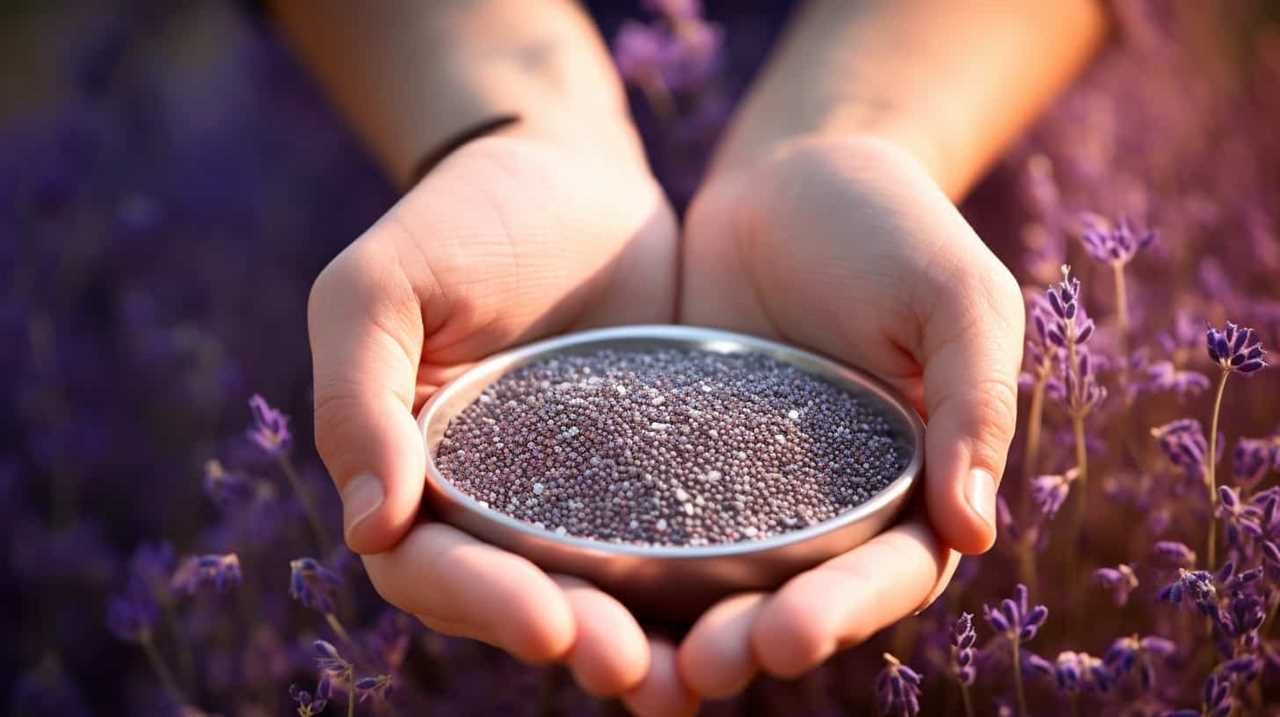
Here are some enticing chia seed combinations to tantalize your taste buds:
-
Chia seed smoothie recipes: Blend chia seeds with your favorite fruits, vegetables, and liquid for a refreshing and nutrient-rich smoothie.
-
Chia seed pudding variations: Mix chia seeds with plant-based milk, sweetener, and flavorings like cocoa powder or vanilla extract to create a creamy and satisfying pudding.
These chia seed combinations offer a delightful balance of flavors, textures, and health benefits.

Now, let’s dive into the benefits of energy bars and how they can fuel your body for optimal performance.
Benefits of Energy Bars
One can experience numerous benefits from consuming energy bars, particularly those made with chia seeds, nuts, and dried fruits. These bars not only provide a convenient and portable source of energy but also offer a range of essential nutrients.
Energy bars are designed to fuel the body, making them a great option for athletes, busy professionals, or anyone in need of a quick and nutritious snack. The importance of nutrition in energy bars can’t be overstated. They’re often packed with protein, fiber, healthy fats, vitamins, and minerals, making them a well-rounded option for maintaining optimal health and wellness.
These bars can aid in muscle recovery, support digestive health, boost energy levels, and provide a satisfying and delicious treat.
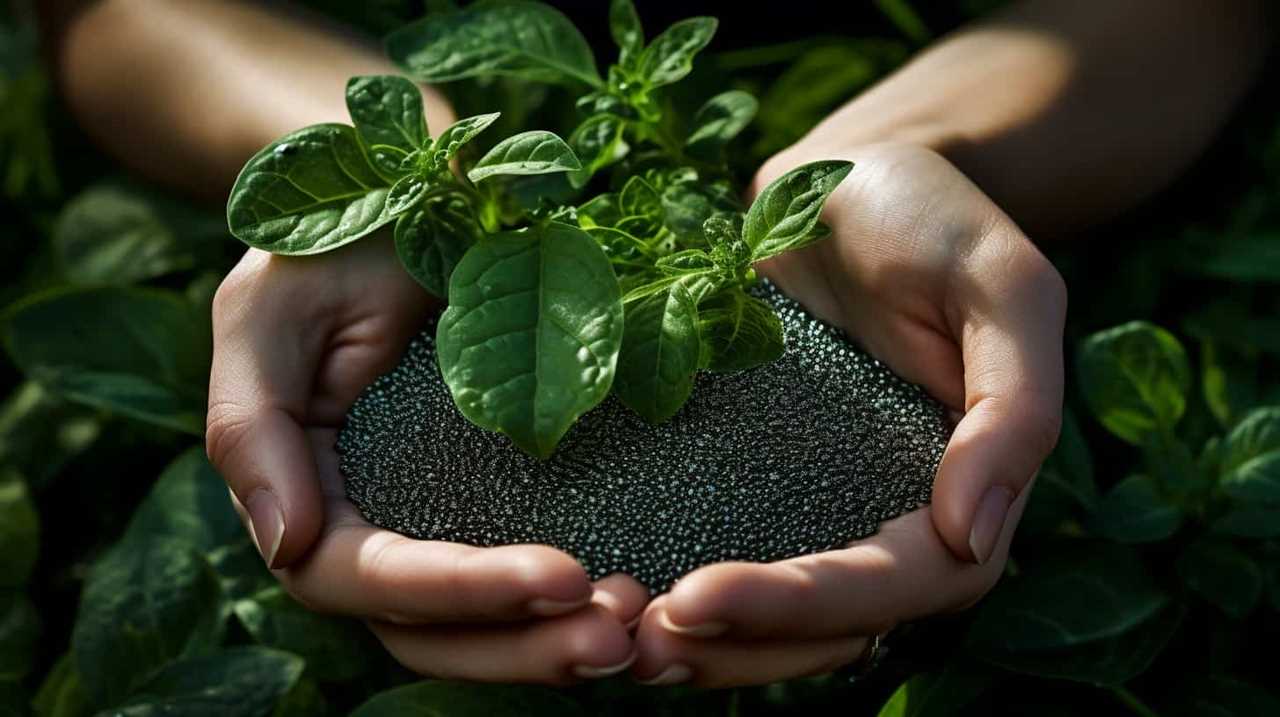
As we delve into the benefits of energy bars, let’s transition into the next section and explore the delightful world of creamy chia seed smoothie bowls.
Creamy Chia Seed Smoothie Bowl
For a delicious and nutritious breakfast option, try my go-to recipe for a creamy chia seed smoothie bowl. It’s the perfect way to start your day with a burst of energy and a boost of essential nutrients. Here are five reasons why you should give this chia seed smoothie bowl a try:
- Chia seeds are packed with fiber, which helps keep you feeling full and satisfied throughout the morning.
- This smoothie bowl is a great source of plant-based protein, making it an ideal option for vegetarians and vegans.
- You can customize your smoothie bowl with a variety of toppings, such as fresh fruits, nuts, and granola, to add texture and flavor.
- The creamy texture of the smoothie bowl is incredibly satisfying, making it feel like a treat rather than just a regular breakfast.
- There are endless variations of chia seed smoothie bowls, so you can switch up the flavors and ingredients to keep things interesting.
With all these benefits, it’s no wonder chia seed smoothie bowls are becoming a popular choice for breakfast.
But if you’re looking for something savory, keep reading to learn about chia seed crackers with herbed cashew spread.
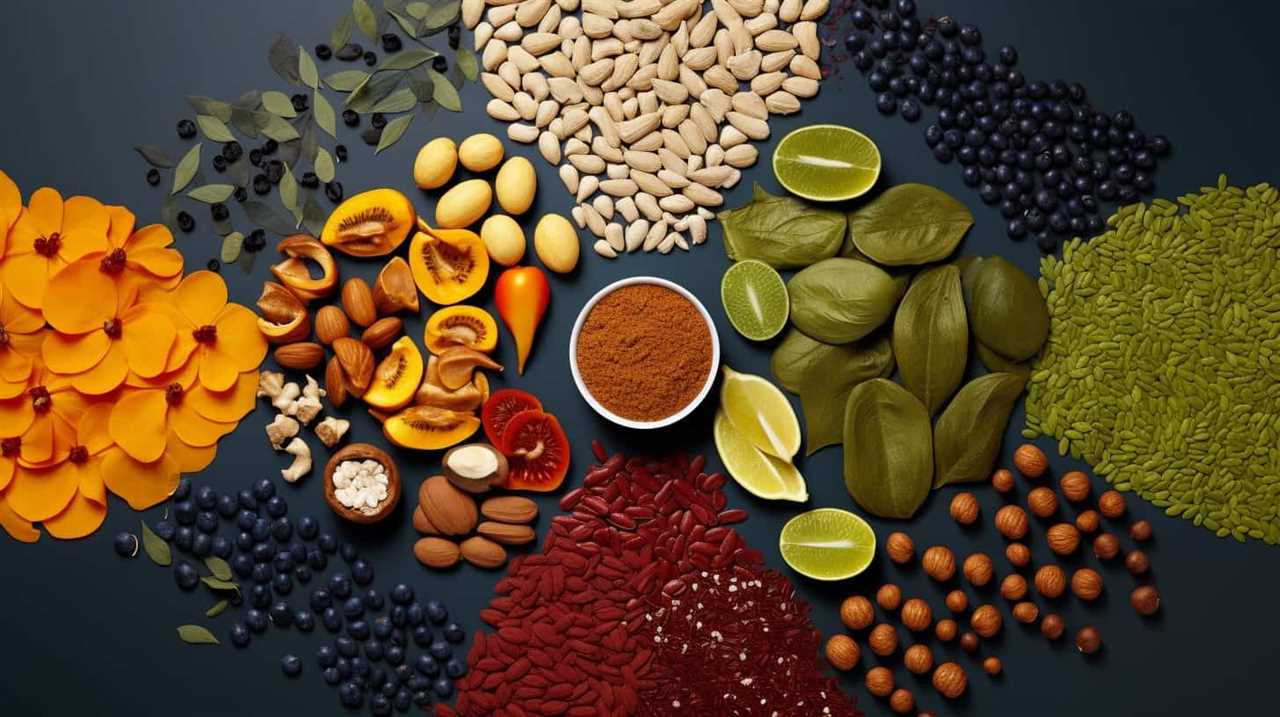
Chia Seed Crackers With Herbed Cashew Spread
Continuing from the previous subtopic, I absolutely love these chia seed crackers with herbed cashew spread. They’re the perfect combination of crunchy and creamy, and they make for a delicious and satisfying snack.
These chia seed crackers are packed with nutrients and are a great way to incorporate more chia seeds into your diet. The chia seeds provide a subtle crunch, while the cashew spread adds a creamy and savory element.
The herbed cashew spread adds a burst of flavor and creaminess, making these crackers even more irresistible. These creative chia seed snacks aren’t only delicious but also nutritious, making them a great option for anyone looking for a healthy and flavorful snack.
Chia Seed Falafel With Tahini Sauce
Let’s talk about the deliciousness that’s chia seed falafel with tahini sauce.
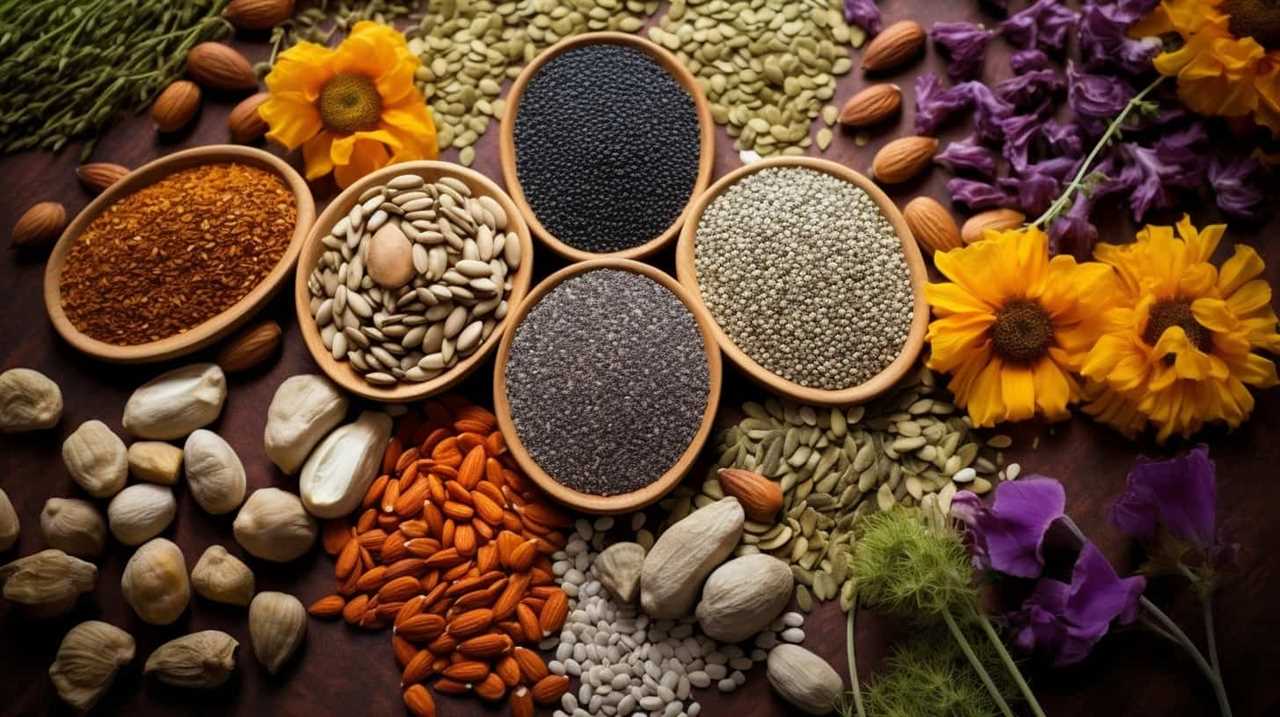
These flavorful vegan falafel balls are packed with protein and bursting with Middle Eastern spices.
And when you pair them with a creamy tahini sauce, it takes the dish to a whole new level of yum.
Get ready for a flavor explosion in every bite!
Flavorful Vegan Falafel
I absolutely adore the flavorful vegan falafel made with chia seeds and served with a creamy tahini sauce. It’s a delicious and nutritious alternative to traditional falafel, packed with plant-based protein and loaded with flavor.
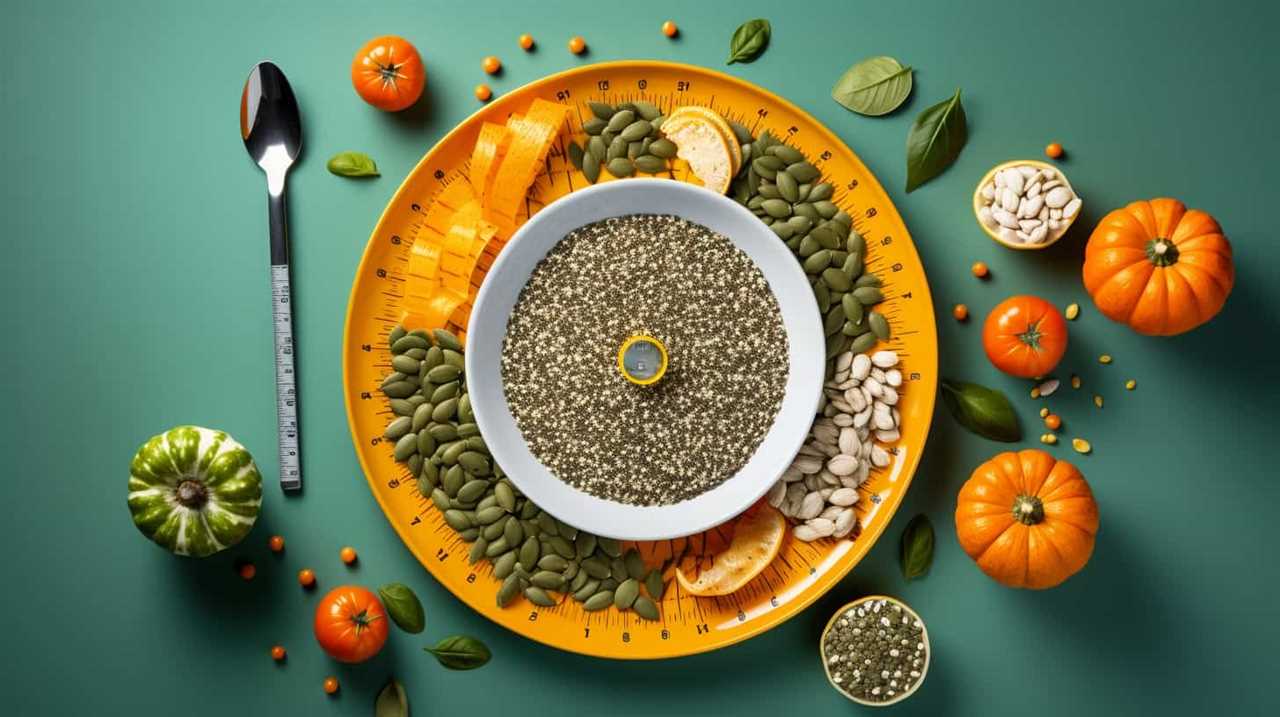
Here are five reasons why this vegan falafel is a must-try:
-
Chia Seed Twist: The addition of chia seeds gives the falafel a unique texture and adds a boost of omega-3 fatty acids, fiber, and antioxidants.
-
Protein Powerhouse: This falafel is a fantastic vegan protein source, providing a satisfying and filling meal option.
-
Burst of Flavor: The falafel is seasoned with a blend of aromatic spices, creating a burst of flavors with every bite.
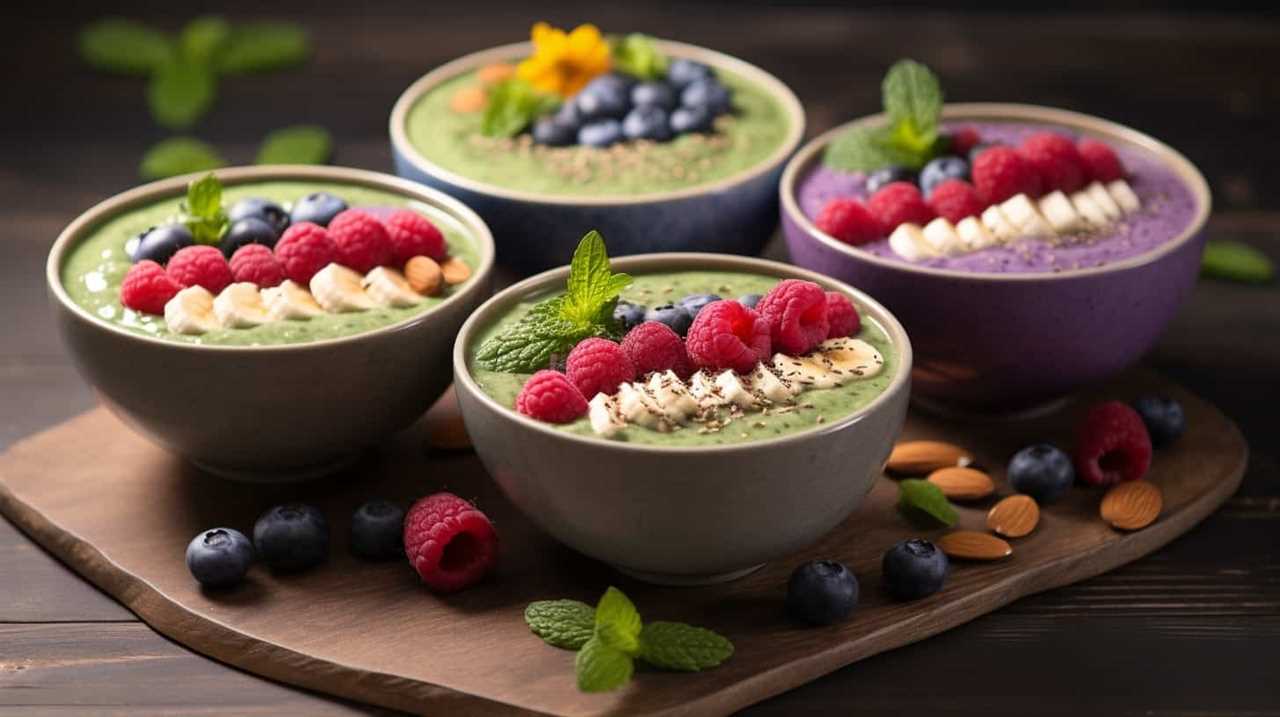
-
Creamy Tahini Sauce: The creamy tahini sauce complements the falafel perfectly, adding a rich and creamy element to the dish.
-
Versatile Delight: This falafel is incredibly versatile and can be enjoyed in a variety of ways – in pita pockets, as a salad topping, or even as a party appetizer.
Indulge in this flavorful vegan falafel, and you won’t be disappointed!
Creamy Tahini Sauce
Building upon the flavorful vegan falafel made with chia seeds, I can’t wait to share the recipe for the creamy tahini sauce that perfectly complements this delightful dish.

Tahini, a paste made from sesame seeds, isn’t only a versatile ingredient but also offers several benefits when incorporated into a vegetarian diet. Rich in healthy fats, protein, and fiber, tahini provides a nutritious boost to any meal. Its creamy texture and nutty flavor make it a great addition to both savory and sweet dishes.
Besides using tahini as a dip or spread, there are creative ways to incorporate it into non-traditional dishes. For example, drizzle tahini sauce over roasted vegetables or mix it into salad dressings for a creamy twist. The possibilities are endless, and tahini adds a unique and delicious touch to vegetarian recipes.
Chia Seed Stuffed Bell Peppers With Quinoa and Black Beans
A delicious combination of quinoa, black beans, and chia seeds fills these bell peppers with a burst of flavor and nutritious goodness. These Chia Seed Stuffed Bell Peppers With Quinoa and Black Beans are a satisfying and healthy option for any vegetarian meal. Here’s why you’ll love them:
-
Versatility: You can personalize this recipe by adding your favorite vegetables or spices for a unique twist.
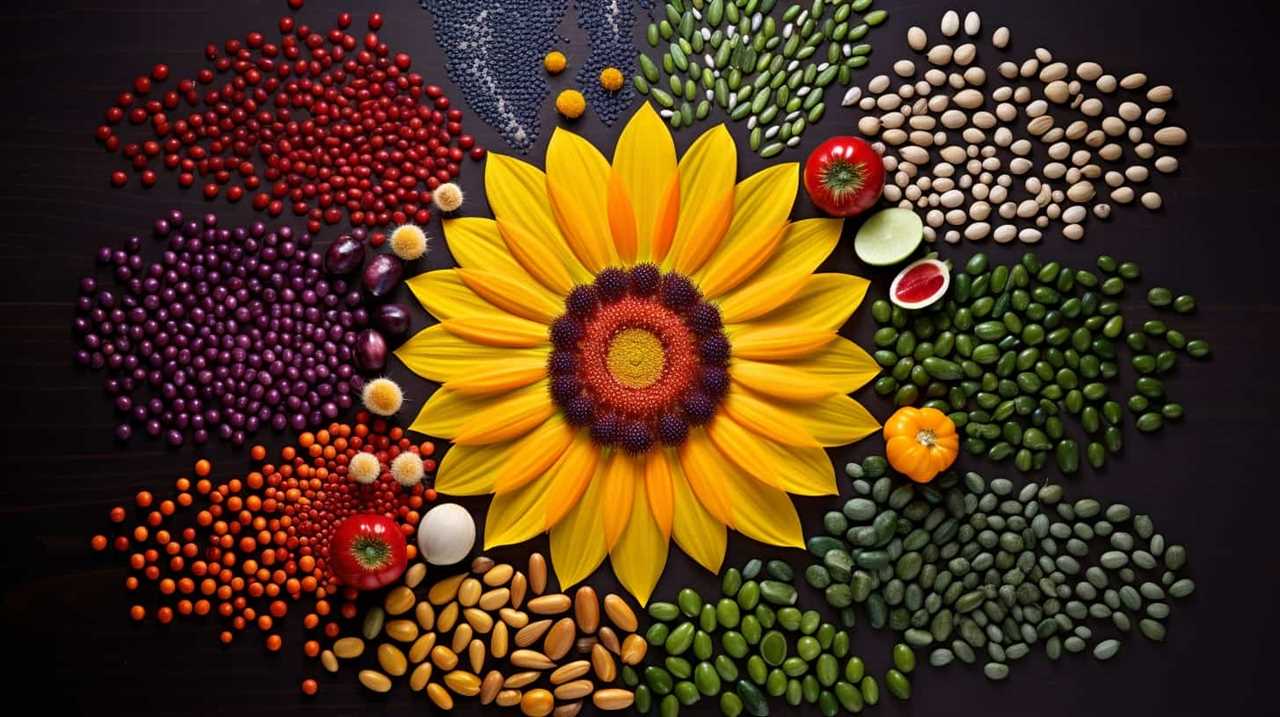
-
Protein-packed: Quinoa and black beans provide a great source of plant-based protein, helping to keep you feeling full and satisfied.
-
Omega-3 goodness: Chia seeds are a fantastic source of omega-3 fatty acids, which are essential for brain health and overall well-being.
-
Texture and crunch: The combination of quinoa, black beans, and chia seeds creates a delightful texture with a subtle crunch.
-
Flavor explosion: The spices and herbs used in this recipe bring out the natural flavors of the ingredients, resulting in a delicious and savory dish.
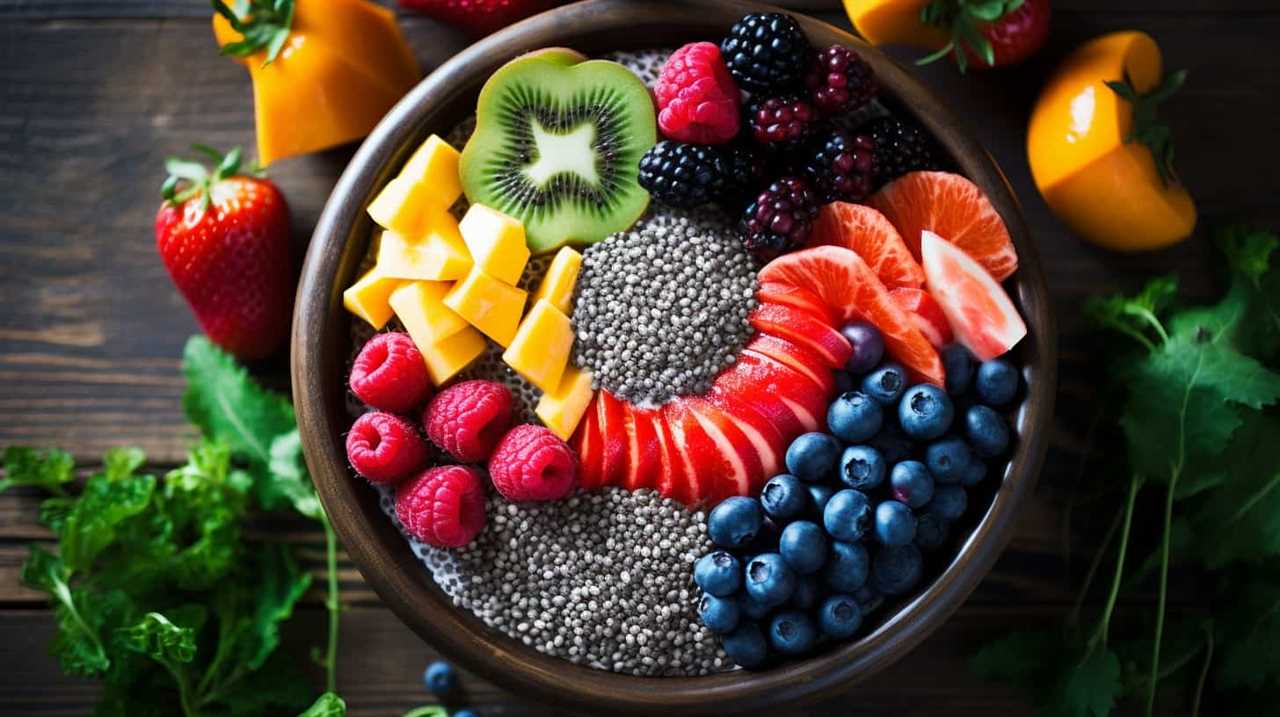
These Chia Seed Stuffed Bell Peppers With Quinoa and Black Beans are a wholesome and flavorful meal that will leave you feeling nourished and satisfied.
Chia Seed Pancakes With Fresh Berries and Maple Syrup
Continuing with the theme of nutritious and delicious chia seed recipes, let’s explore the mouthwatering world of Chia Seed Pancakes With Fresh Berries and Maple Syrup.
These pancakes are a delightful way to start your day, packed with the goodness of chia seeds and topped with a burst of fresh berries and sweet maple syrup. The chia seeds add a subtle crunch and a boost of omega-3 fatty acids, making these pancakes not only delicious but also nutritious.
If you’re looking for a healthier alternative to traditional maple syrup, you can try using agave nectar or honey. The natural sweetness of the berries combined with the rich flavors of the chia seeds and maple syrup alternatives create a perfect harmony of taste and texture.
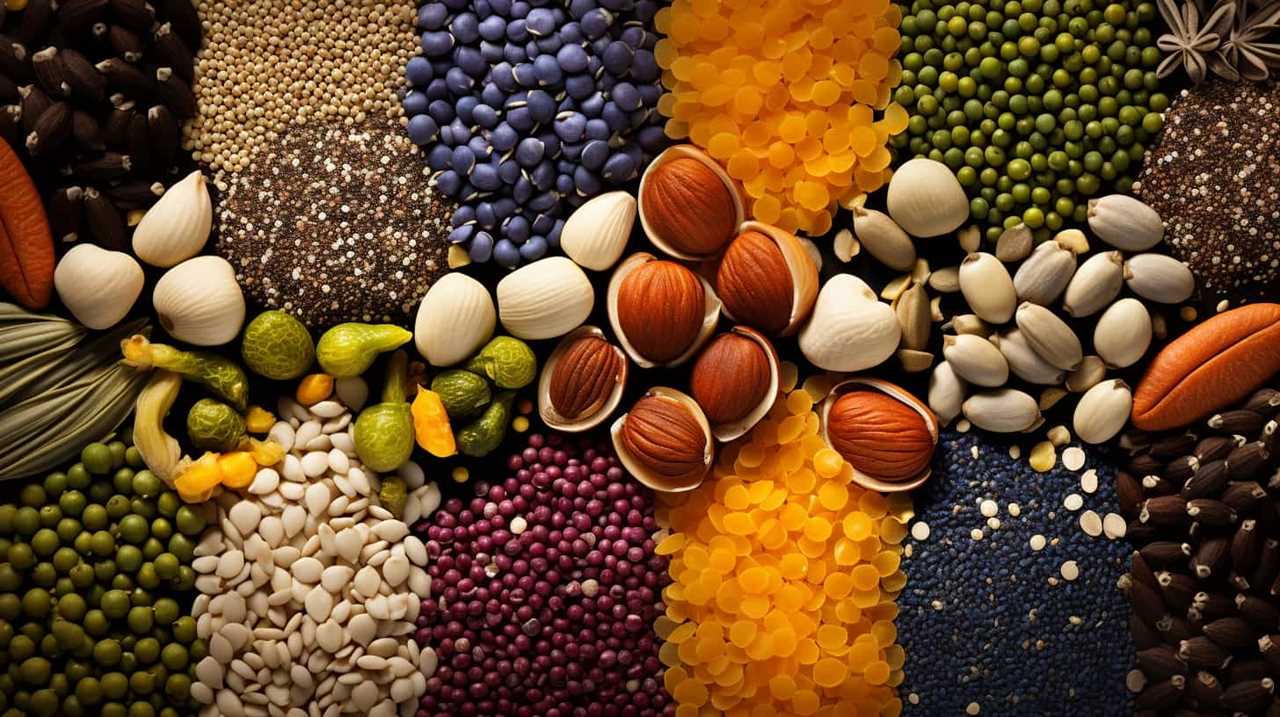
Now, let’s move on to the next mouthwatering recipe: chia seed veggie stir-fry with tofu and sesame seeds.
Chia Seed Veggie Stir-Fry With Tofu and Sesame Seeds
To prepare the Chia Seed Veggie Stir-Fry With Tofu and Sesame Seeds, I start by heating a tablespoon of oil in a large skillet over medium heat. Once the oil is heated, I add the tofu, vegetables, and the stir-fry sauce. I cook everything until the veggies are tender-crisp and the tofu is golden brown. Finally, I sprinkle the chia seeds and sesame seeds on top for an extra nutritional boost and a delightful crunch.
This stir-fry is packed with nutritious ingredients and bursting with flavor. Here’s what you’ll need:
- Chia seeds: These tiny powerhouses are rich in omega-3 fatty acids and fiber, adding a nutritional boost to the dish.
- Tofu: A versatile and protein-packed ingredient that absorbs the flavors of the stir-fry sauce.
- Sesame seeds: These nutty seeds provide a delightful crunch and a hint of toasty flavor.
- Fresh vegetables: Load up on colorful veggies like bell peppers, broccoli, carrots, and snap peas for added texture and nutrients.
- Stir-fry sauce: Create a flavorful sauce with soy sauce, garlic, ginger, and a touch of sweetness.
This chia seed veggie stir-fry with tofu and sesame seeds is a delicious and healthy option for your next meatless meal. Enjoy!
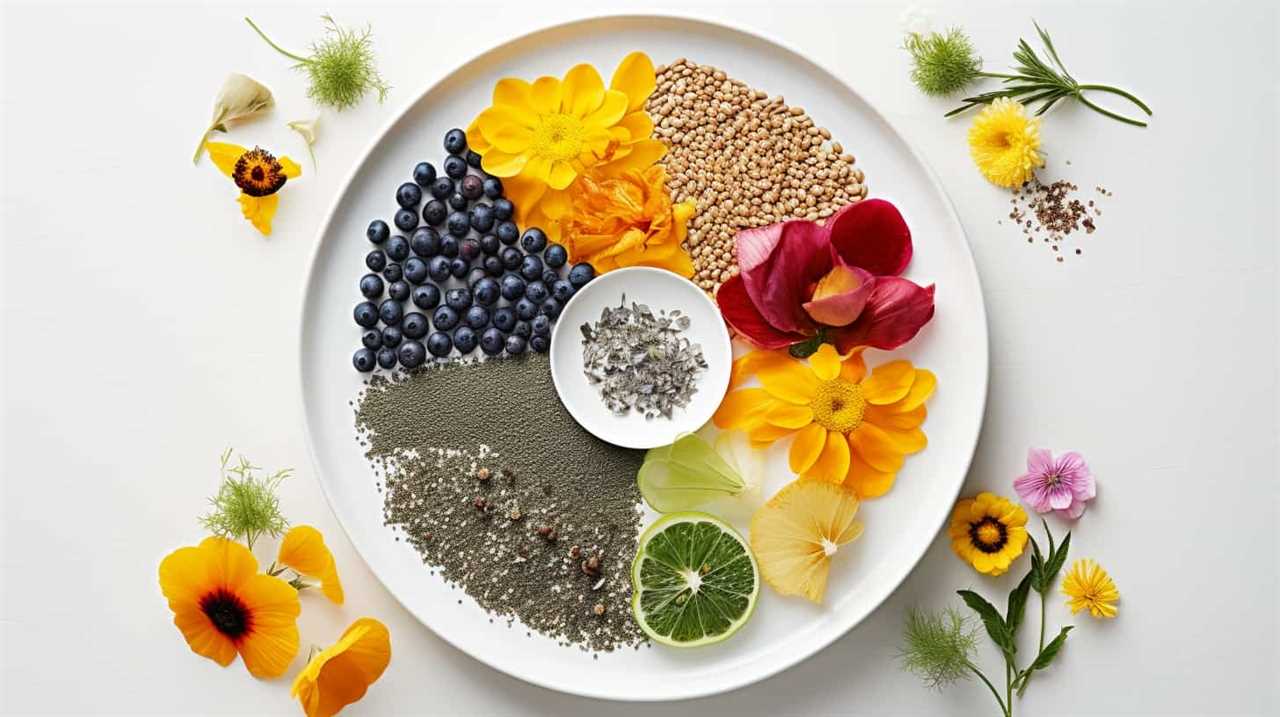
Frequently Asked Questions
Can Chia Seeds Be Substituted for Other Ingredients in These Recipes?
Yes, chia seeds can be used as an egg substitute in these recipes. They add moisture and binding properties. To incorporate chia seeds into baked goods, soak them in water until they form a gel-like consistency.
Are These Recipes Suitable for Those With Gluten or Dairy Allergies?
Yes, these recipes are suitable for those with gluten or dairy allergies. There are alternative ingredients like gluten-free flour or non-dairy milk that can be used. Just be mindful of any specific precautions or considerations when using substitutes.
How Long Do Chia Seeds Need to Soak Before Using Them in These Recipes?
Chia seeds need to soak for at least 15 minutes before using them in these recipes. Soaking them helps release their gel-like texture, which adds a unique and delicious element to dishes.
Can I Make These Recipes Ahead of Time and Store Them for Later?
Yes, you can definitely make these recipes ahead of time and store them for later. They are perfect for meal prep and there are also freezing options available to ensure their freshness and convenience.
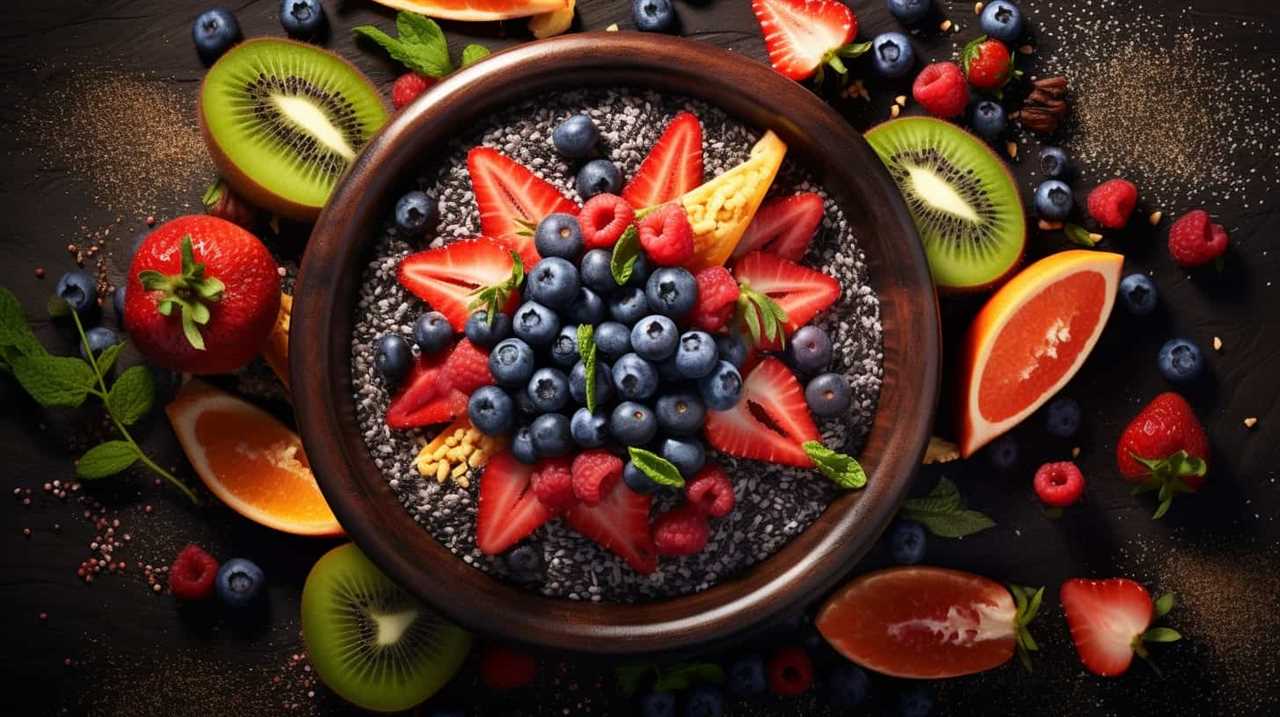
Are There Any Tips or Tricks for Cooking With Chia Seeds That Would Be Helpful for These Recipes?
Are there any tips or tricks for cooking with chia seeds that would be helpful for these recipes? Absolutely! Chia seeds are versatile and nutritious, adding a satisfying crunch and a boost of omega-3 fatty acids to your vegetarian dishes. Let me share some cooking tips with you!
Conclusion
Incorporating chia seeds into vegetarian recipes isn’t only delicious but also nutritious. From creamy smoothie bowls to flavorful stir-fries, these top chefs have created mouthwatering dishes that are packed with protein and essential nutrients.
As the saying goes, ‘You are what you eat,’ so why not indulge in these superseed-packed recipes and nourish your body from the inside out?
Try them for yourself and discover the amazing benefits of chia seeds in your vegetarian diet.
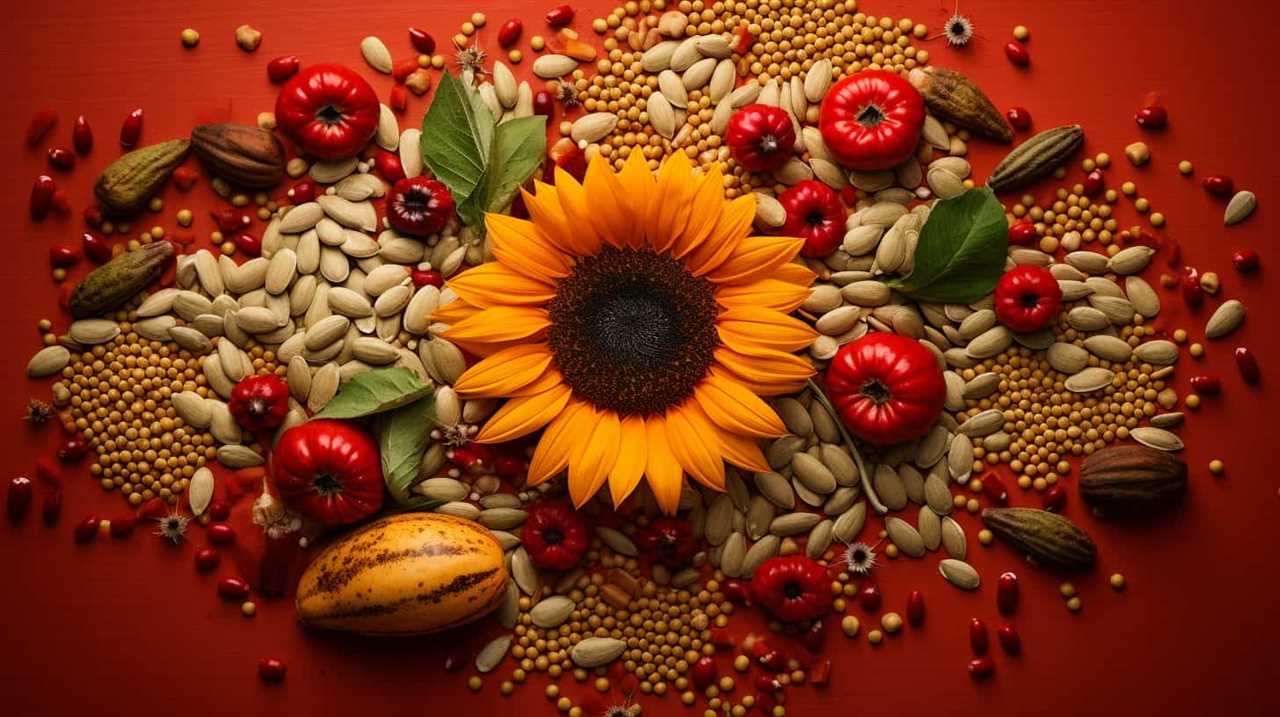
Hi, I’m Sarah. I write for Turtle Tree Seeds, a news blog that loves food – all kinds of food. But especially bacon, chocolate, and veggies. We’re on a mission to show the world that you can enjoy all of those things, even kale and brussels sprouts. Because we believe that when it comes to food, there’s no such thing as guilty pleasures. Just pleasures.
I’m also a huge fan of puns (obviously).
Culinary Uses of Chia Seeds
12 Gluten-Free Recipe Ideas Using Super Seeds

Hi there! Do you know that including super seeds in your gluten-free meals can boost both their flavor and nutritional content? I’m excited to share some great news with you.
In this article, I’ll be sharing 12 amazing recipe ideas that feature super seeds like chia. From mouthwatering puddings to energy-packed bars and even gluten-free bread, get ready to revamp your menu with these seed-filled delights.
So, let’s dive in and discover the wonders of super seeds together!
Key Takeaways
- Chia seeds are a superfood packed with nutrients, fiber, protein, omega-3 fatty acids, and antioxidants.
- Incorporating chia seeds into everyday meals can improve heart health, support digestion, and boost energy levels.
- Chia seeds can be easily added to various recipes such as chia seed pudding, chia seed energy bars, chia seed pancakes, and chia seed salad dressing.
- Chia seeds can elevate the nutritional content of any dish and are a great option for gluten-free recipes.
Chia Seed Pudding
One of my favorite gluten-free recipe ideas using super seeds is making a delicious chia seed pudding. Chia seed pudding recipes have gained popularity due to their simplicity and health benefits. Chia seeds are packed with essential nutrients like fiber, protein, and omega-3 fatty acids, making them a nutritious addition to any dessert.
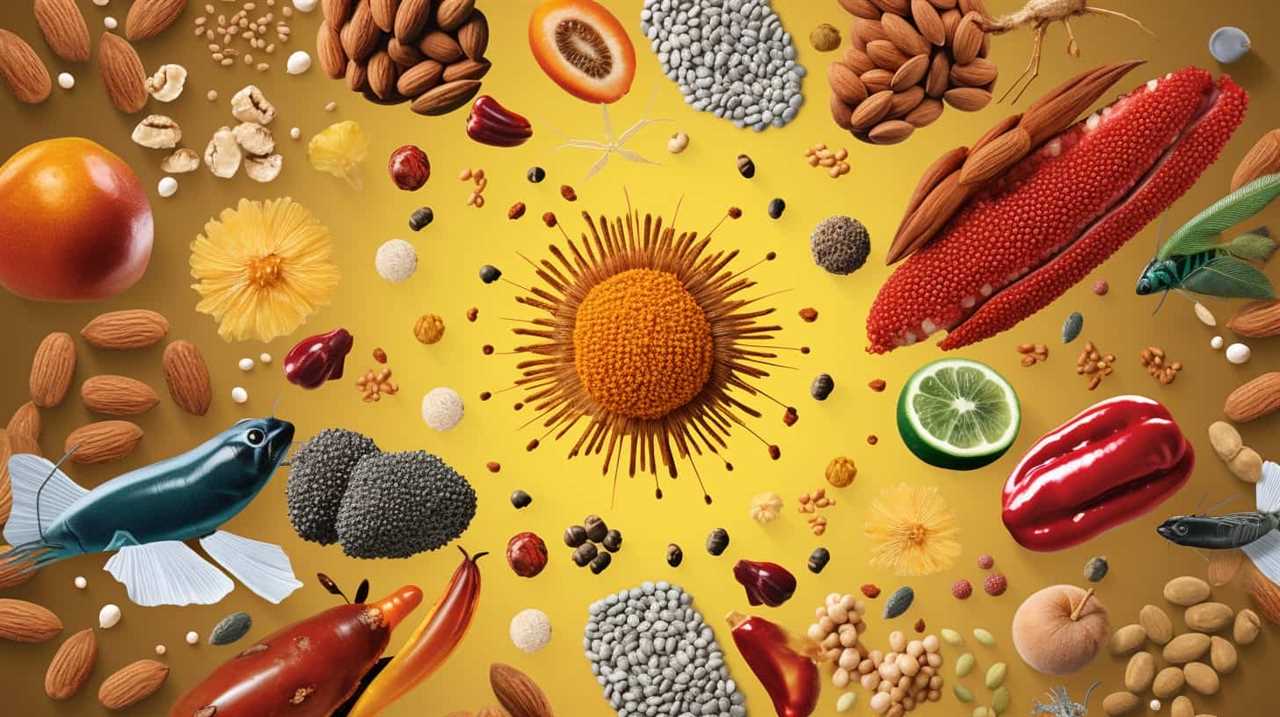
Incorporating chia seeds into desserts can help boost digestion, promote heart health, and provide a feeling of fullness. To make chia seed pudding, simply mix chia seeds with your choice of milk and sweetener, and let it sit overnight in the refrigerator. The chia seeds will absorb the liquid and create a creamy, pudding-like consistency.
It’s a versatile recipe that can be customized with various toppings like fruits, nuts, or coconut flakes. Now, let’s move on to another delicious treat – chia seed energy bars.
Chia Seed Energy Bars
I love making homemade energy bars, and chia seed energy bars are one of my favorites. Chia seeds are packed with nutritional benefits, including omega-3 fatty acids, fiber, and antioxidants.
Not only are they a great source of energy, but they also help to keep me feeling full and satisfied throughout the day. There are so many variations of chia bars you can make, from chocolate to peanut butter to fruit flavors, making them a versatile and delicious snack option.

Nutritional Benefits of Chia
Chia seed energy bars offer a powerhouse of nutrition. These tiny seeds pack a punch when it comes to their health benefits. Rich in omega-3 fatty acids, fiber, protein, and antioxidants, chia seeds are a great addition to any diet. They can help improve heart health, support digestion, and boost energy levels. Incorporating chia into everyday meals is easy and versatile. Whether you sprinkle them on top of yogurt or oatmeal, mix them into smoothies, or use them as an egg substitute in baking, chia seeds can elevate the nutritional content of any dish. Their ability to absorb liquid and form a gel-like consistency also makes them a perfect ingredient for energy bars. In the table below, you can see the nutritional breakdown of chia seeds and understand why they are considered a superfood.
| Nutrient | Amount per 1 ounce (28 grams) |
|---|---|
| Fiber | 9 grams |
| Protein | 4 grams |
| Omega-3 fatty acids | 5 grams |
| Antioxidants | High |
With their impressive nutritional profile, chia seeds are a fantastic addition to any diet. Now, let’s explore some delicious variations of chia bars to further incorporate these nutritious seeds into our lives.
Variations of Chia Bars
When it comes to chia bars, I love experimenting with different variations to create delicious and nutritious snacks. Chia seeds are incredibly versatile and can be easily incorporated into a variety of recipes.
One variation of chia bars that I enjoy making is chia seed muffins. These muffins aren’t only packed with fiber and protein from the chia seeds, but they also make for a convenient on-the-go snack.
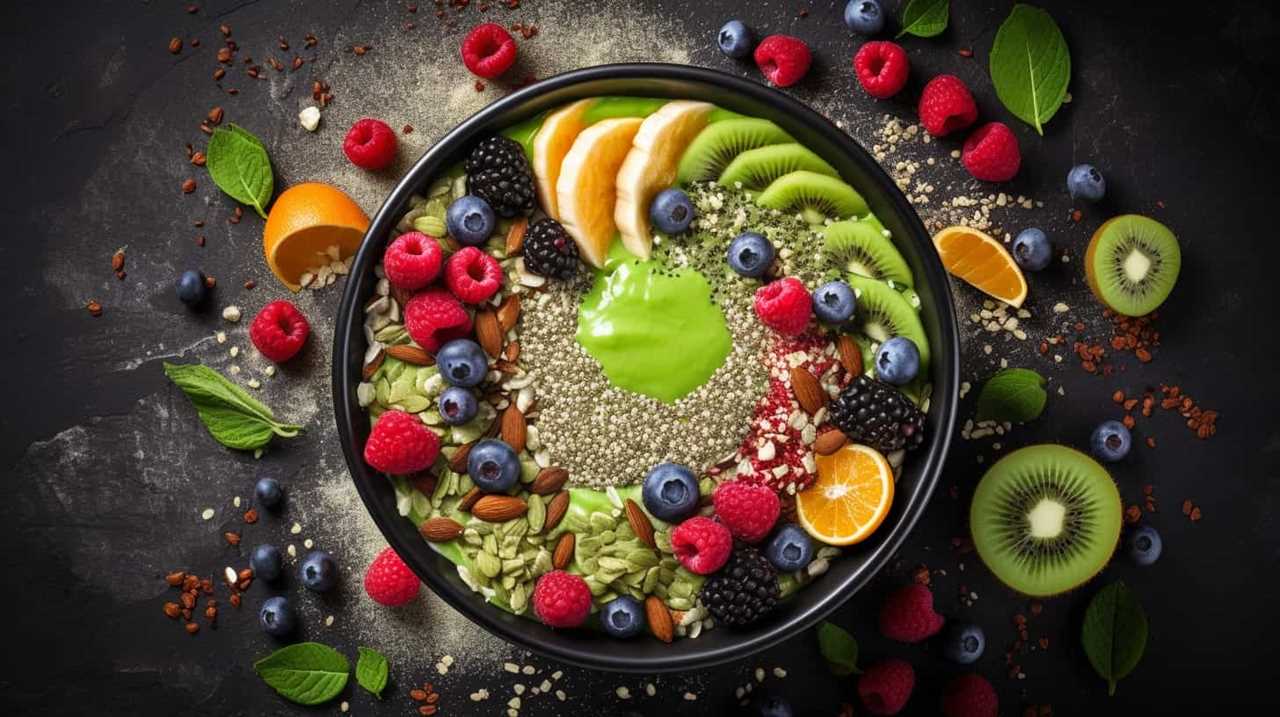
Another tasty option is chia seed smoothie recipes. By adding chia seeds to your favorite smoothie, you not only boost the nutritional value with omega-3 fatty acids and antioxidants, but you also create a thick and creamy texture.
Whether you prefer muffins or smoothies, chia bars are a great way to enjoy the benefits of chia seeds in a delicious and convenient form.
Chia Seed Smoothie Bowl
I love starting my day with a delicious and nutritious Chia Seed Smoothie Bowl. Chia seeds are packed with beneficial nutrients like fiber, protein, and omega-3 fatty acids, making them a great addition to any breakfast.
To make my smoothie bowl even more exciting, I like to get creative with my toppings by adding fresh fruits, nuts, and a drizzle of honey for a touch of sweetness.

Nutritional Benefits of Chia
While incorporating chia seeds into my diet, I’ve discovered the nutritional benefits of adding them to a delicious smoothie bowl.
Chia seeds are packed with nutrients that can support overall health and well-being. These tiny seeds are an excellent source of fiber, which can aid in digestion and promote feelings of fullness. They’re also rich in omega-3 fatty acids, which are essential for brain health and can help reduce inflammation in the body. Additionally, chia seeds are loaded with antioxidants, which can protect against cell damage and support a healthy immune system.
Incorporating chia seeds into your everyday meals, such as in a smoothie bowl, is a simple and delicious way to boost your nutrient intake and reap these health benefits.
Creative Chia Toppings
To enhance the flavor and nutritional value of my chia seed smoothie bowl, I love experimenting with a variety of creative chia toppings. Chia seeds aren’t only packed with nutrients like fiber, protein, and omega-3 fatty acids, but they also add a delightful crunch and texture to any dish.
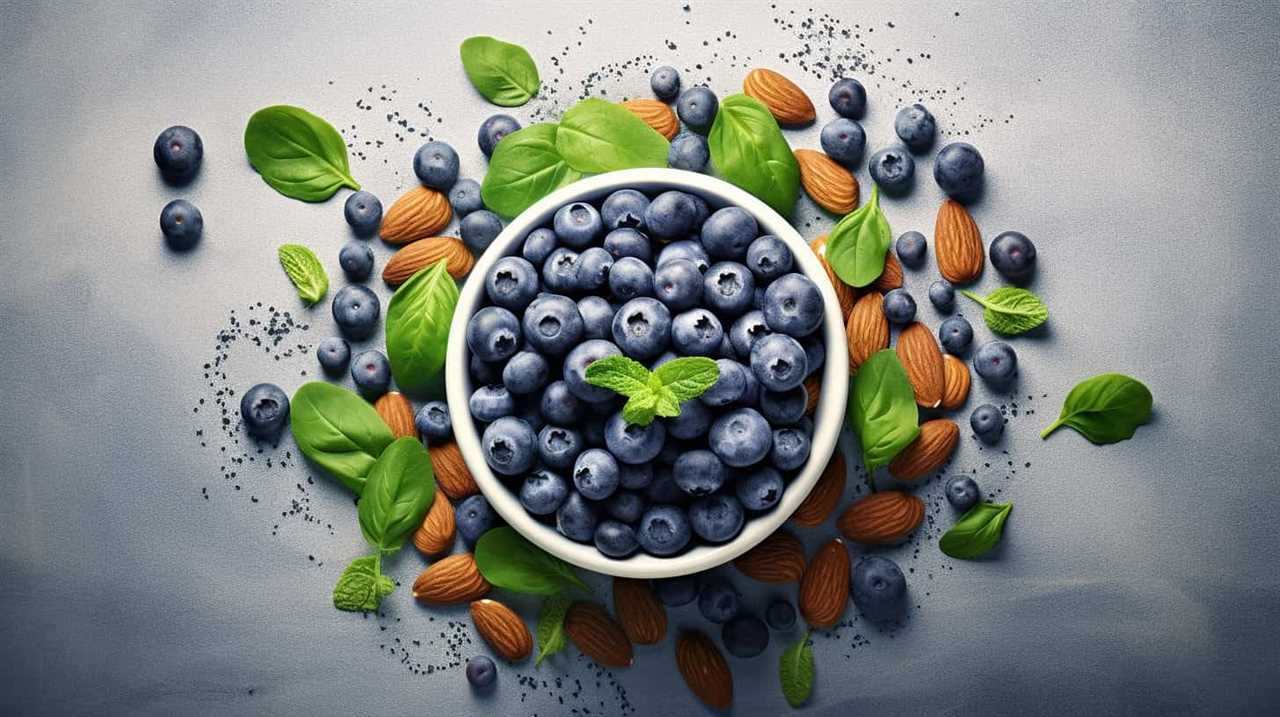
One of my favorite chia seed smoothie recipes is a tropical blend of pineapple, mango, and coconut milk. To make it even more delicious, I top it off with a mixture of toasted coconut flakes, chopped almonds, and a sprinkle of chia seeds. The combination of flavors and textures is simply divine.
Another creative chia seed dessert idea is to make a chocolate chia pudding and add fresh berries, crushed nuts, and a drizzle of honey on top.
The possibilities are endless when it comes to creative chia toppings, so don’t be afraid to get creative and experiment with different flavors and textures to take your chia seed smoothie bowl to the next level.
Chia Seed Crackers
One can easily make delicious gluten-free chia seed crackers using this simple recipe. Chia seeds are a nutritional powerhouse, packed with fiber, omega-3 fatty acids, and antioxidants. They also add a delightful crunch to these homemade crackers. Here’s a quick and easy recipe to get you started:
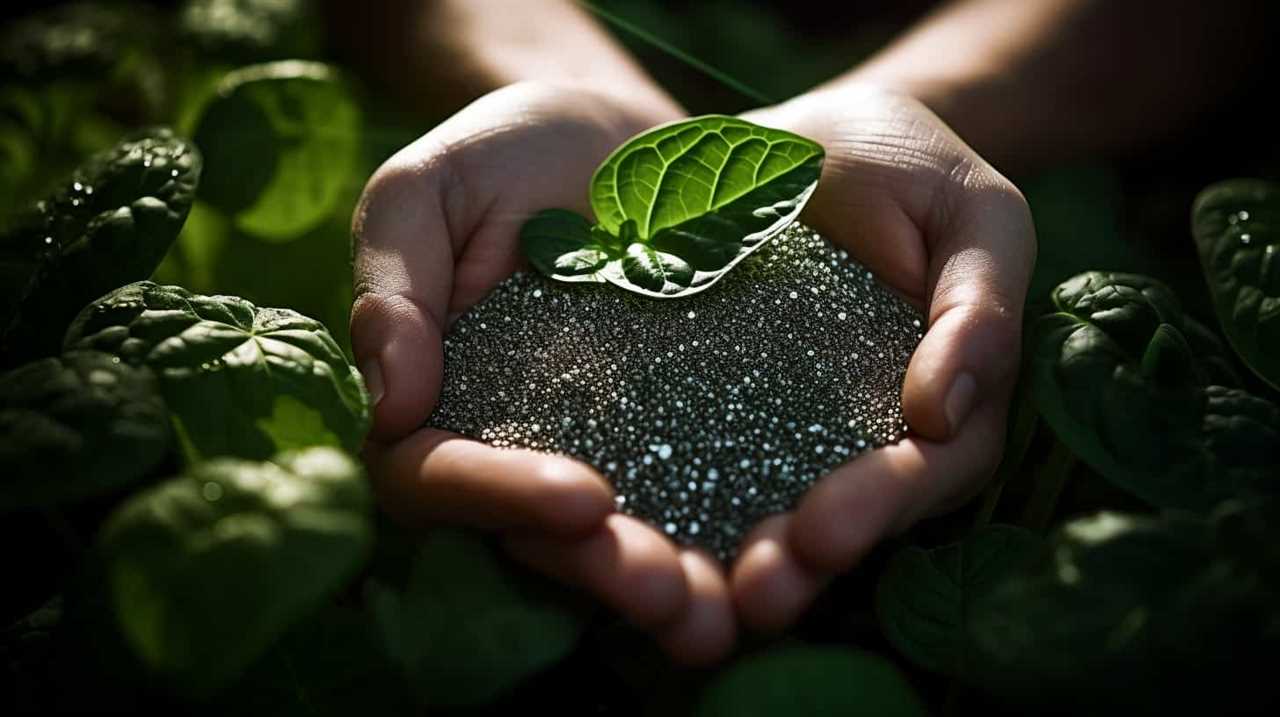
Chia Seed Crackers Recipe
| Ingredients | Instructions |
|---|---|
| 1 cup chia seeds | 1. In a bowl, mix chia seeds with 1 cup of water and let it sit for 15 minutes. |
| 1/2 cup almond flour | 2. Preheat the oven to 350°F (175°C) and line a baking sheet with parchment paper. |
| 1/2 cup sunflower seeds | 3. Add almond flour, sunflower seeds, salt, and any desired herbs or spices to the chia seed mixture. Mix well. |
| 1/2 tsp salt | 4. Spread the mixture evenly on the prepared baking sheet, ensuring it’s thin and even. |
| Herbs or spices (optional) | 5. Bake for 20-25 minutes or until the edges start to turn golden brown. |
| Water | 6. Remove from the oven and let it cool completely before breaking into crackers. |
These chia seed crackers are not only gluten-free but also rich in nutrients. They make a perfect snack or can be enjoyed with dips and spreads. Here are a few tips for making crunchy chia seed crackers:
- Ensure the mixture is spread thinly and evenly on the baking sheet to achieve a crisp texture.
- Experiment with different herbs and spices to add flavor and variety.
- Let the crackers cool completely before breaking them to allow them to become crispy.
- Store in an airtight container to maintain their crunchiness.
With this simple recipe and these tips, you can easily make your own batch of crunchy and nutritious chia seed crackers. Enjoy!
Chia Seed Pancakes
For the next gluten-free recipe idea, let’s dive into the world of chia seed pancakes. These delicious pancakes aren’t only gluten-free but also packed with nutrients. Here are three reasons why chia seed pancakes should be your go-to gluten-free breakfast option:
-
Health benefits: Chia seeds are rich in omega-3 fatty acids, fiber, and antioxidants, making them a nutritious addition to your breakfast. They can help improve digestion, reduce inflammation, and boost heart health.
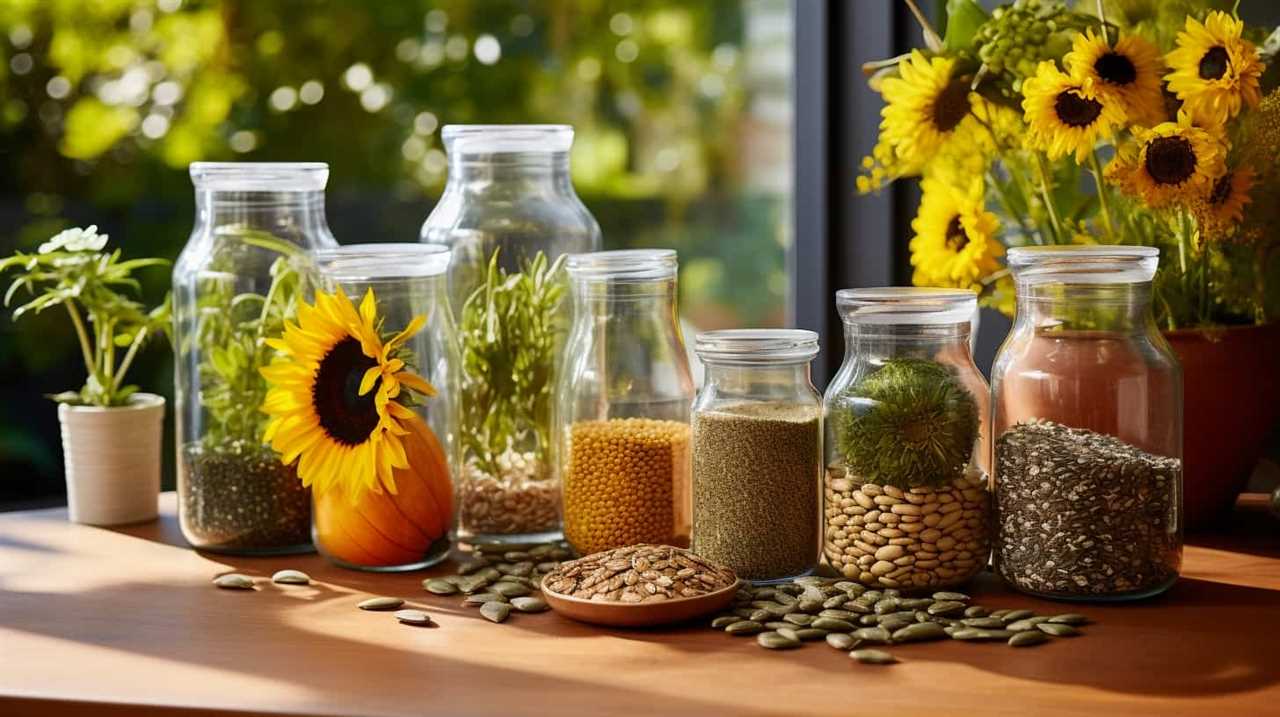
-
Gluten-free alternative: If you’re following a gluten-free diet, chia seed pancakes are a great alternative to traditional pancakes. They provide a satisfying texture and taste without any gluten.
-
Easy to make: Chia seed pancakes are simple to prepare. Just mix chia seeds with your favorite gluten-free flour, add some liquid, and cook them like regular pancakes. You can also customize them with toppings like fruits, nuts, or maple syrup.
Start your day right with these chia seed pancakes and enjoy a delicious, gluten-free breakfast option that’s both healthy and satisfying.
Chia Seed Salad Dressing
I love using chia seed salad dressing because it offers a versatile and healthy option for dressing up my salads.
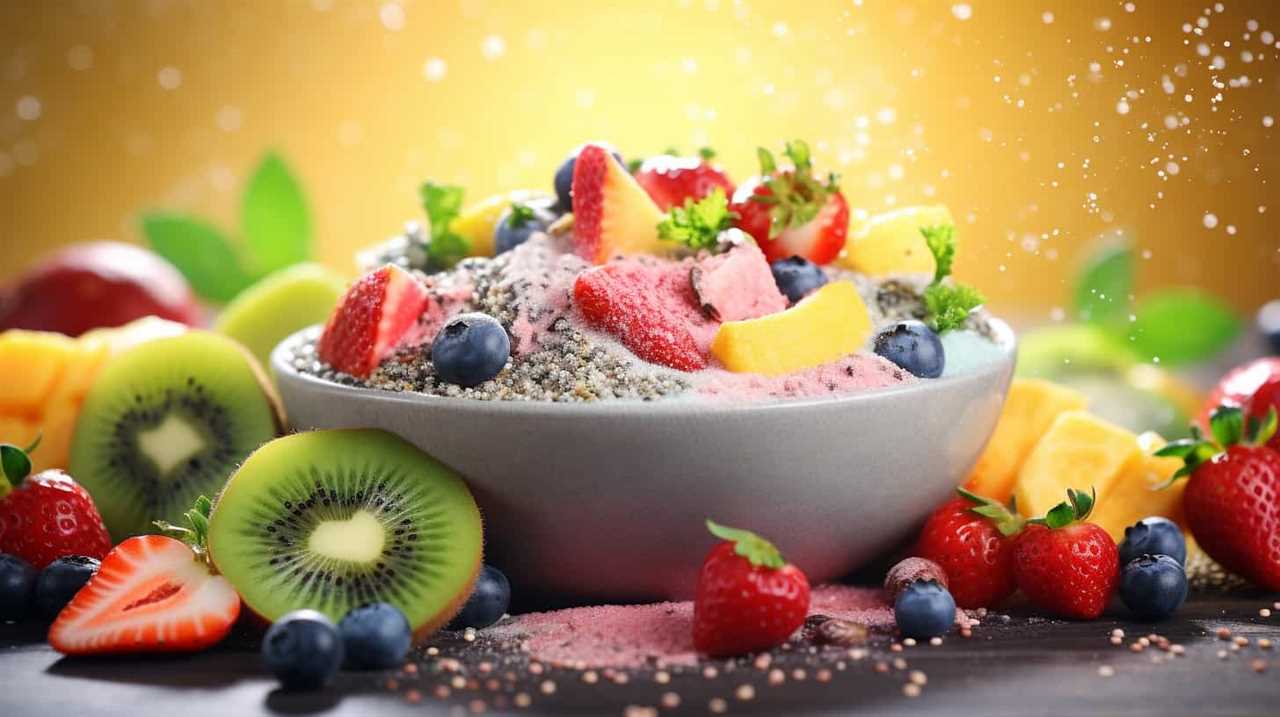
Chia seeds are packed with nutrients like omega-3 fatty acids and fiber, which can help support heart health and digestion.
Plus, making homemade chia seed salad dressing is quick and easy, allowing me to customize the flavors to my liking and avoid any added preservatives or artificial ingredients.
Versatile Salad Dressing Options
To create a versatile salad dressing using chia seeds, start by combining the ingredients in a blender. Chia seeds are a great addition to dressings because they add a thickening quality and an extra boost of nutrition.
Here are three unique flavor combinations you can try with chia seed infused oils:

-
Lemon and Herb: Combine chia seed infused olive oil with fresh lemon juice, minced garlic, chopped herbs like parsley and dill, and a pinch of salt and pepper. This dressing is light, tangy, and perfect for summer salads.
-
Honey Mustard: Mix chia seed infused avocado oil with Dijon mustard, honey, apple cider vinegar, and a dash of garlic powder. The result is a creamy and slightly sweet dressing that pairs well with mixed greens or roasted vegetables.
-
Balsamic Maple: Blend chia seed infused walnut oil with balsamic vinegar, pure maple syrup, Dijon mustard, and a sprinkle of dried thyme. This dressing has a rich and slightly sweet flavor, making it a perfect complement to hearty salads.
Health Benefits of Chia
Continuing from the previous topic, the health benefits of chia in salad dressing are numerous and impressive.

Chia seeds are packed with nutrients and offer a range of health benefits. They’re rich in fiber, omega-3 fatty acids, and antioxidants, which can help support digestion, heart health, and inflammation reduction.
Adding chia seeds to your salad dressing not only enhances the nutritional value but also adds a pleasant texture.
Additionally, chia seeds can be incorporated into various recipes, such as chia pudding and chia seed smoothies. These variations provide a delicious and nutritious way to enjoy the benefits of chia.
Now, let’s delve into some easy homemade recipe ideas that will elevate your gluten-free meals to a whole new level.
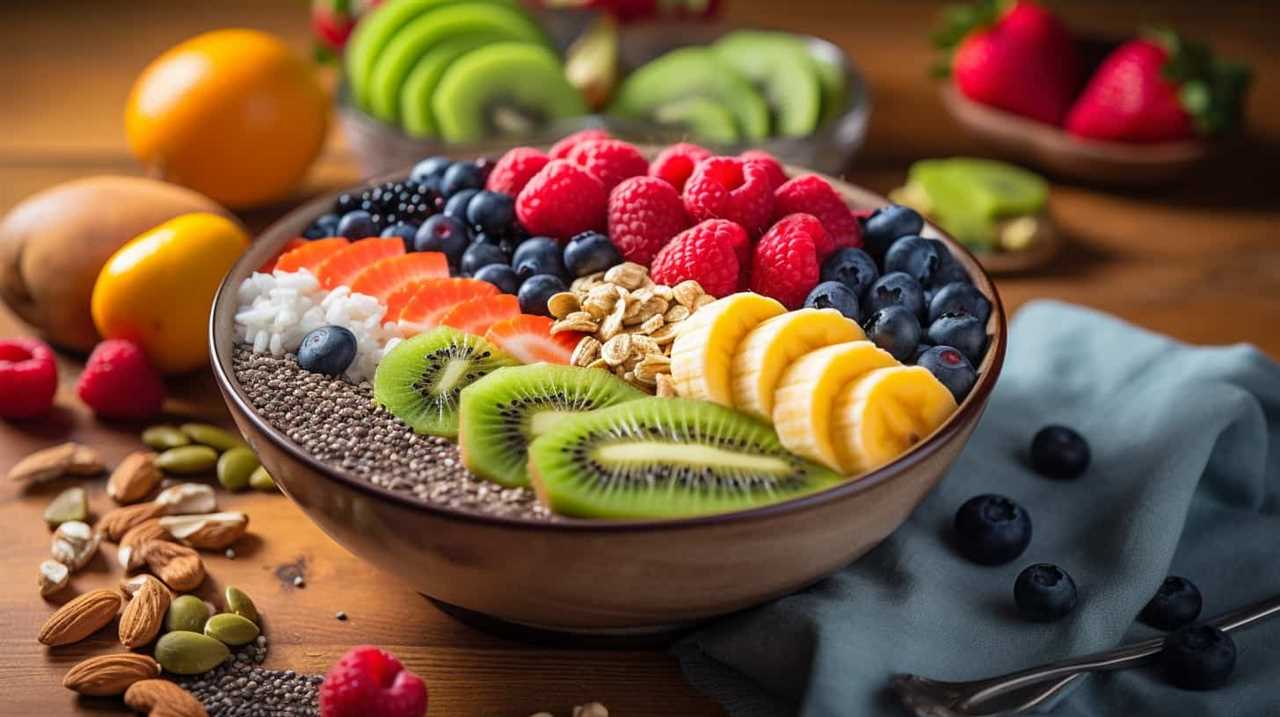
Easy Homemade Recipe Ideas
For creating a delicious and nutritious chia seed salad dressing, I recommend starting with a base of high-quality olive oil. Here’s an easy recipe that you can whip up in no time:
Ingredients:
- 2 tablespoons chia seeds
- 1/4 cup high-quality olive oil
- 2 tablespoons lemon juice
- 1 clove of garlic, minced
- Salt and pepper to taste
Instructions:
-
In a small bowl, combine the chia seeds and olive oil. Let it sit for about 10 minutes to allow the chia seeds to absorb some of the oil and thicken.
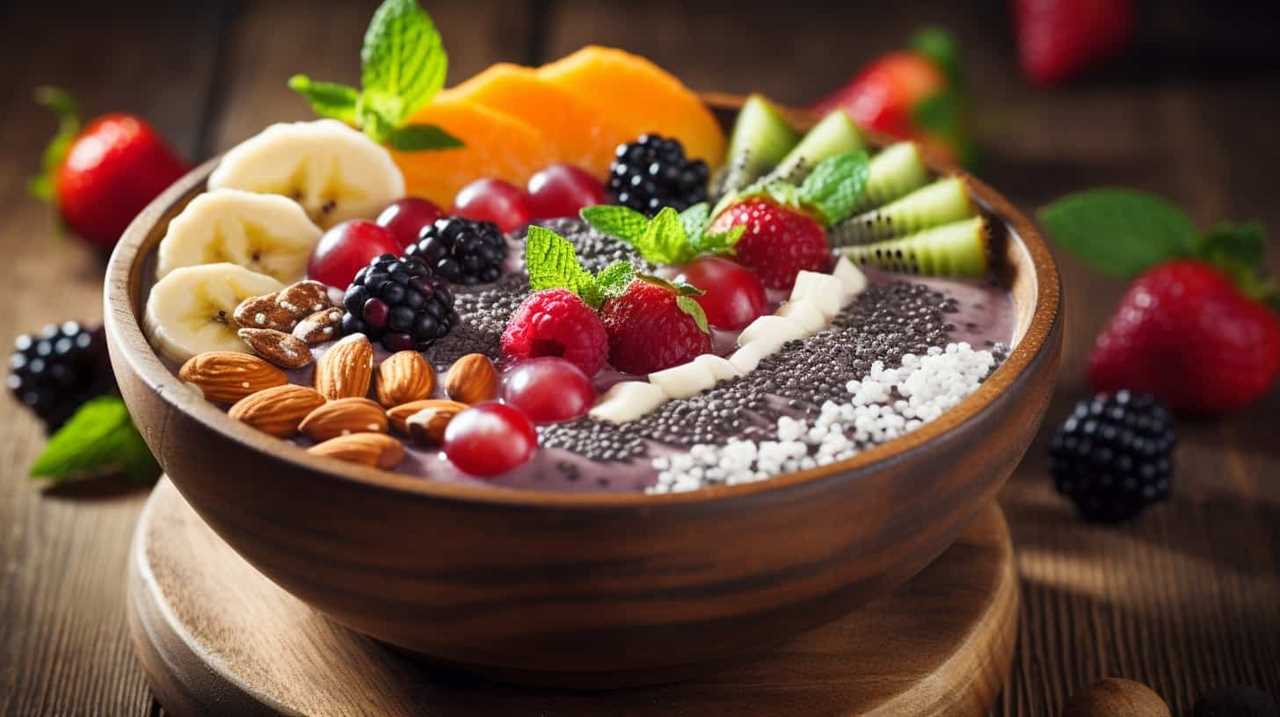
-
Add the lemon juice, minced garlic, salt, and pepper to the bowl. Mix well to combine all the ingredients.
-
Taste and adjust the seasoning if needed.
-
Serve the chia seed salad dressing over your favorite salad or use it as a marinade for grilled vegetables.
This chia seed salad dressing isn’t only easy to make but also packed with nutrients. It’s a great option for those looking for easy breakfast options or quick snack recipes. Enjoy!

Chia Seed Granola Bars
I whipped up some delicious chia seed granola bars using a simple recipe. Chia seeds are incredibly nutritious and can be a great addition to your gluten-free diet. These granola bars are packed with fiber, omega-3 fatty acids, and antioxidants. They make for a perfect on-the-go snack or a quick breakfast option.
The recipe is quite flexible, allowing you to customize the bars to your liking. You can add different nuts, dried fruits, or even chocolate chips for an extra treat. Chia seeds act as a binder, helping to hold the bars together without the need for eggs or additional oils. They also provide a subtle crunch and a boost of protein.
If you’re a fan of chia seed smoothie recipes or chia seed muffins, you’ll definitely love these granola bars. Give them a try and enjoy a healthy and delicious snack!
Chia Seed Overnight Oats
To make a delicious and nutritious breakfast, I love preparing a bowl of chia seed overnight oats. Not only are they easy to make, but they’re also packed with essential nutrients and provide a great start to the day.
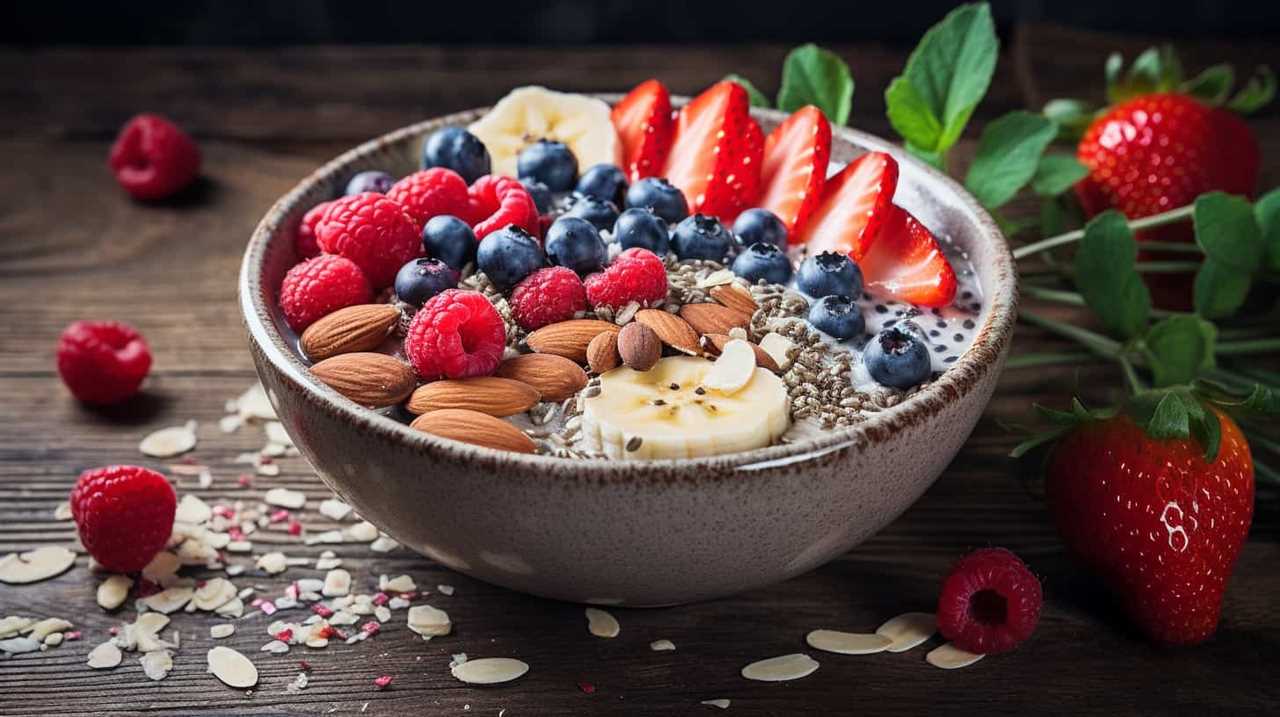
Here are three reasons why you should try chia seed overnight oats:
-
High in fiber: Chia seeds are an excellent source of fiber, which aids digestion and helps keep you feeling full throughout the morning.
-
Omega-3 fatty acids: Chia seeds are rich in omega-3 fatty acids, which are essential for brain health and reducing inflammation in the body.
-
Versatility: Chia seed overnight oats can be customized to suit your taste preferences. You can add fruits, nuts, or even chocolate chips to create a variety of flavors.
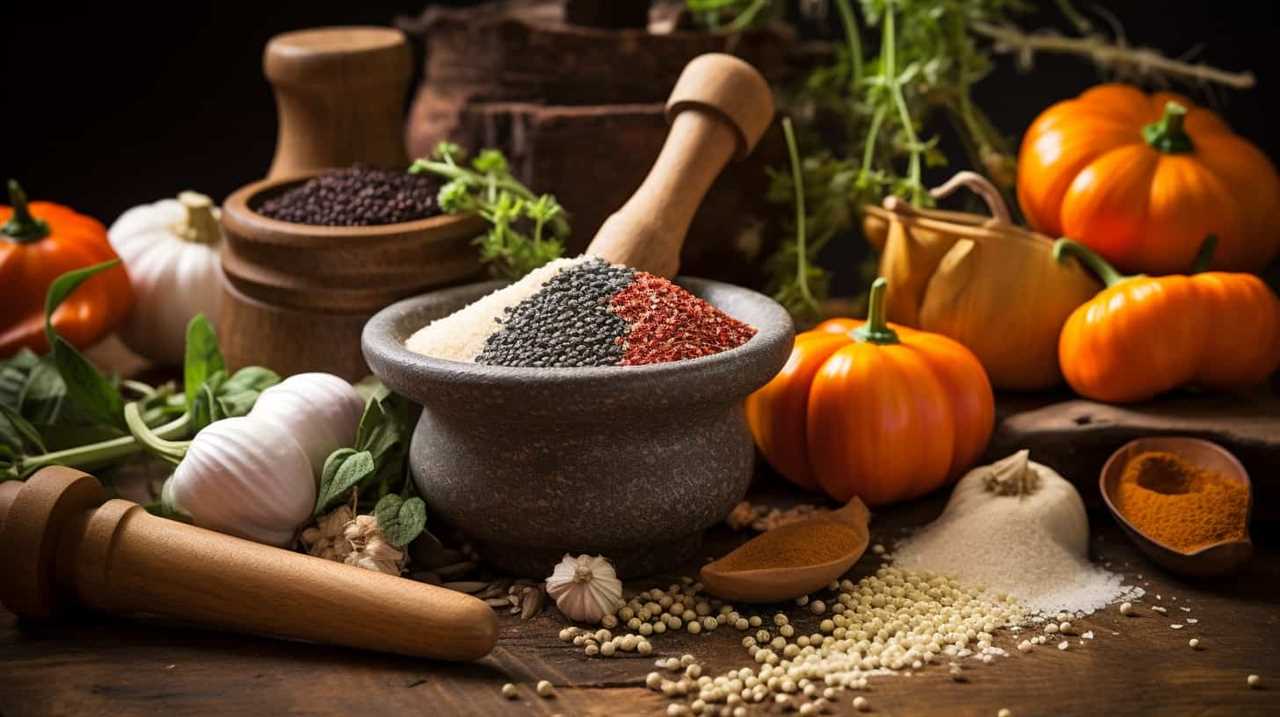
Now that we’ve explored chia seed overnight oats, let’s move on to another tasty option: chia seed protein balls.
Chia Seed Protein Balls
One option for incorporating chia seeds into a gluten-free recipe is by making chia seed protein balls. These delicious and nutritious snacks are packed with protein, fiber, and omega-3 fatty acids, making them a great choice for a post-workout boost or a quick afternoon pick-me-up.
To make chia seed protein balls, simply combine chia seeds, nut butter, honey or maple syrup, and your choice of protein powder in a bowl. Mix well until all the ingredients are combined, then roll the mixture into small balls. You can also get creative by adding in other ingredients like dried fruits, nuts, or chocolate chips for added flavor and texture.
Chia seed protein balls can be stored in the fridge for up to a week, making them a convenient and healthy snack option. For even more variety, try incorporating chia seeds into your favorite smoothie recipes for an extra nutritional boost.

Chia Seed Banana Bread
Continuing the discussion on incorporating chia seeds into gluten-free recipes, I frequently enjoy making Chia Seed Banana Bread. This delectable bread not only satisfies my cravings for something sweet, but also provides a healthy dose of nutrients. Here are three reasons why I love this recipe:
-
Nutritional powerhouse: Chia seeds are packed with fiber, omega-3 fatty acids, and antioxidants, making them a fantastic addition to any recipe. They add a delightful crunch and boost the nutritional value of the banana bread.
-
Versatile options: Chia seeds can be used in various ways. If you’re looking for more ways to incorporate them into your diet, try adding them to chia seed smoothie recipes or experimenting with chia seed pudding variations.
-
Gluten-free goodness: For those with gluten sensitivities or following a gluten-free diet, this banana bread is a wonderful option. The chia seeds act as a binding agent, eliminating the need for gluten-containing ingredients.
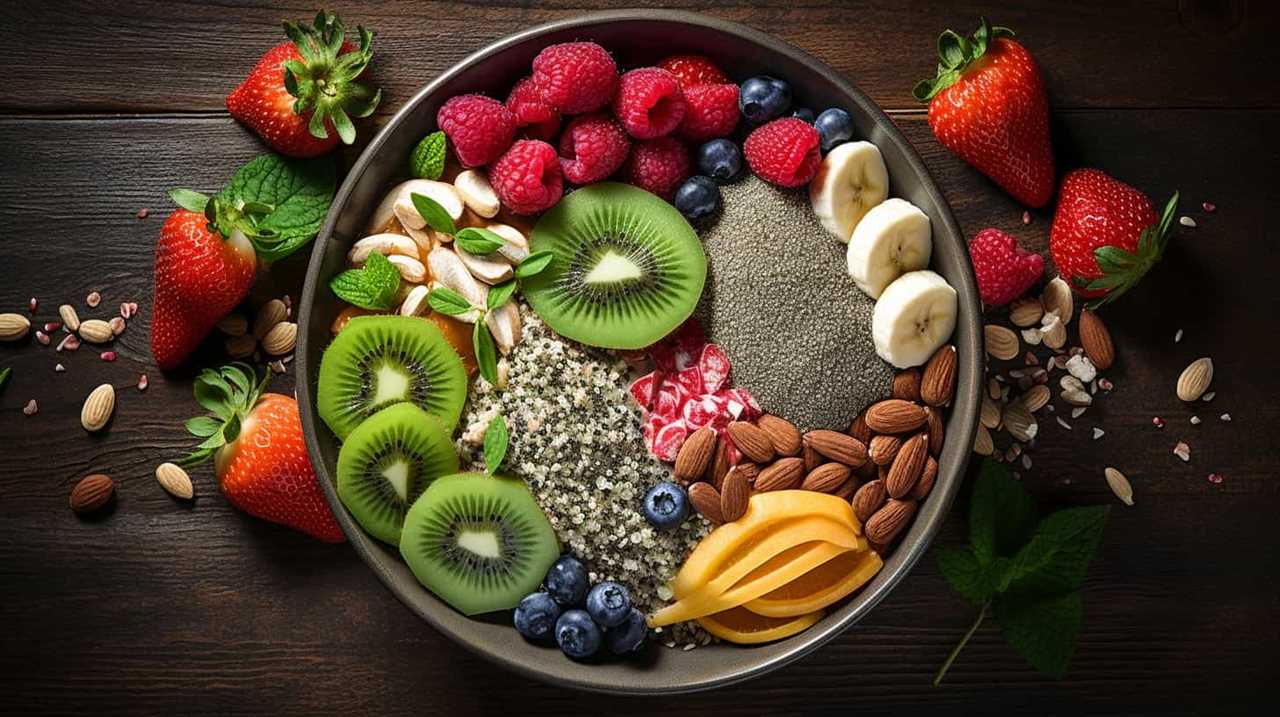
Now that we’ve explored the benefits of Chia Seed Banana Bread, let’s move on to another exciting recipe: chia seed jam.
Chia Seed Jam
Now that we’ve explored the benefits of Chia Seed Banana Bread, let’s delve into the versatility of chia seeds with a delectable chia seed jam recipe.
Chia seeds aren’t only a great addition to baked goods, but they can also be used to make a delicious jam that’s both gluten-free and packed with nutrients.
To make chia seed jam, simply combine your favorite fruit with chia seeds and a sweetener of your choice. The chia seeds will absorb the liquid from the fruit, creating a thick and spreadable jam.
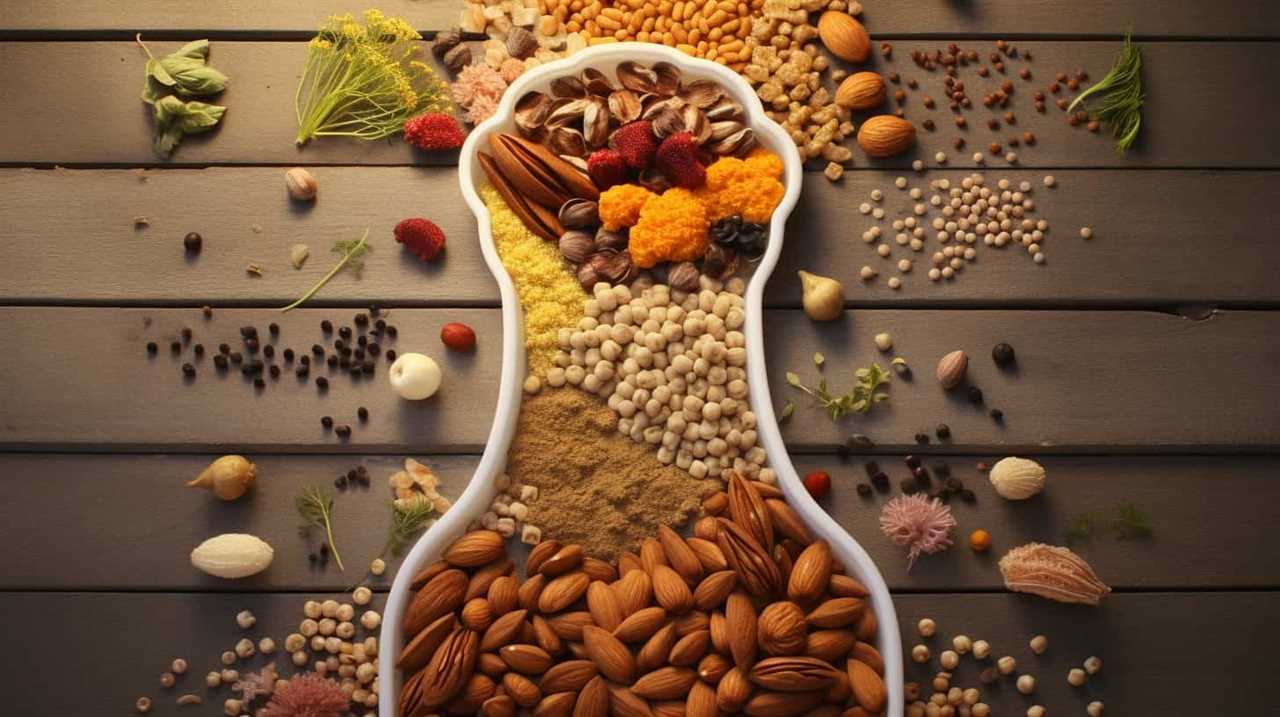
This jam can be used in a variety of ways, from spreading it on toast to adding it to chia seed smoothie recipes or using it as a topping for chia seed pudding variations. The possibilities are endless, and the result is a flavorful and nutritious jam that you’ll love.
Chia Seed Gluten-Free Bread
To make Chia Seed Gluten-Free Bread, I combine chia seeds with gluten-free flour, eggs, and a few other ingredients. This bread isn’t only delicious but also a great option for those who follow a gluten-free diet. Here’s how you can make it:
- Mix together 1 cup of chia seeds and 1 cup of gluten-free flour in a bowl.
- In a separate bowl, beat 4 eggs and add them to the chia seed mixture.
- Add 1/4 cup of honey and 1/4 cup of coconut oil to the mixture, and stir until well combined.
- Pour the batter into a greased loaf pan and bake at 350°F for about 40-45 minutes, or until a toothpick inserted into the center comes out clean.
This Chia Seed Gluten-Free Bread is perfect for sandwiches or as a side with soups and salads. It’s a healthy and tasty alternative to regular bread.
If you’re looking for more ways to incorporate chia seeds into your gluten-free diet, try making chia seed gluten-free cookies or adding them to your favorite smoothie recipes. Enjoy!
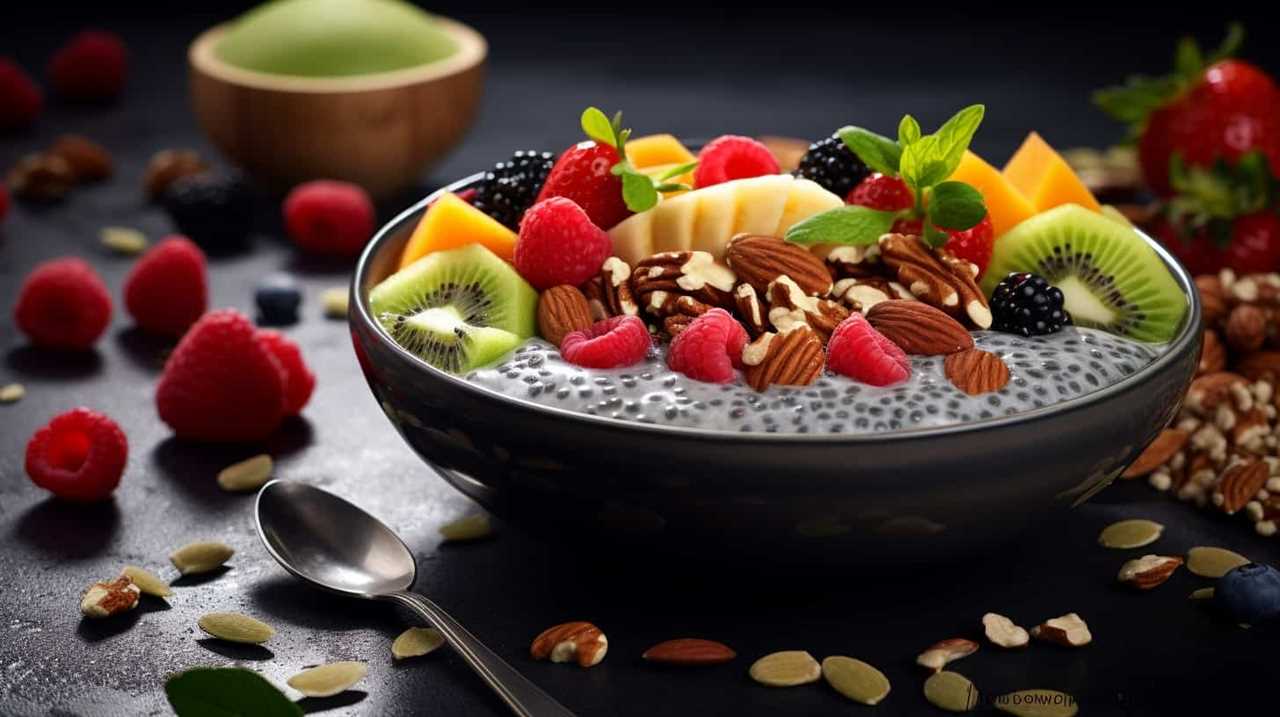
Frequently Asked Questions
Can I Substitute Chia Seeds With Other Types of Seeds in the Chia Seed Pudding Recipe?
Sure, you can substitute chia seeds with other types of seeds in the chia seed pudding recipe. Some options include flax seeds, hemp seeds, or pumpkin seeds. Just make sure to adjust the quantities accordingly for the best results.
Is It Possible to Make Chia Seed Energy Bars Without Using Nuts?
It’s totally possible to make chia seed energy bars without nuts! Instead, try using sunflower seeds, pumpkin seeds, or even shredded coconut for a tasty crunch. There are so many ways to incorporate chia seeds into gluten-free recipes!
Are There Any Alternative Options for Chia Seed Smoothie Bowls for Those Who Don’t Like Dairy?
There are plenty of alternative options for dairy-free smoothie bowls that can be made with creative ways to use super seeds in gluten-free recipes. Let me share some of my favorite ideas!
Can I Make Chia Seed Crackers Without Using an Oven?
I’ve got some great news for you! You can definitely make chia seed crackers without an oven. There are alternative methods like using a dehydrator or even a microwave. Plus, chia seeds can be creatively incorporated into no bake desserts for a delicious treat.

Is It Possible to Make Chia Seed Pancakes Without Using Eggs?
Yes, it’s possible to make chia seed pancakes without using eggs. There are plenty of alternative vegan options that can be used as creative and delicious substitutes in chia seed pancake recipes.
Conclusion
In conclusion, incorporating super seeds like chia into your gluten-free recipes can provide a nutritious and delicious alternative for those with dietary restrictions.
Did you know that chia seeds contain more omega-3 fatty acids than salmon? This means that by including chia seeds in your diet, you can boost your intake of these essential fatty acids, which are important for brain health and reducing inflammation.
So why not give these gluten-free recipes a try and enjoy the health benefits of super seeds?
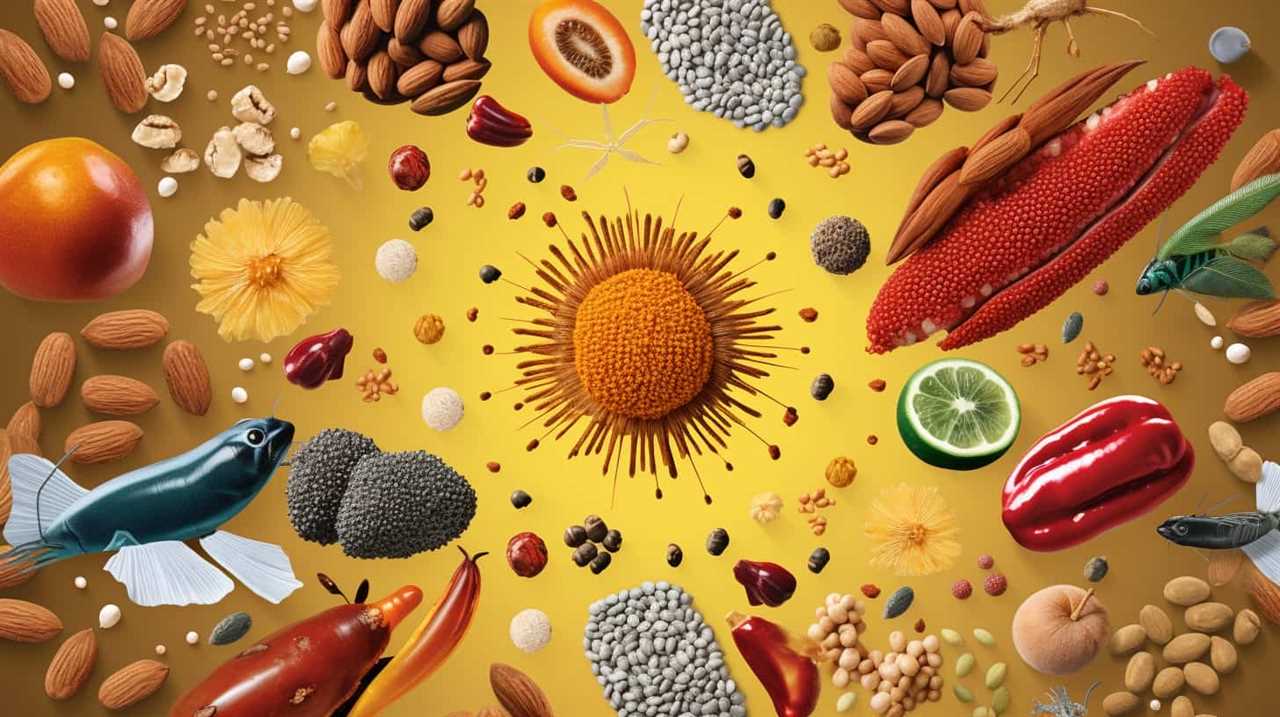
Hi, I’m Sarah. I write for Turtle Tree Seeds, a news blog that loves food – all kinds of food. But especially bacon, chocolate, and veggies. We’re on a mission to show the world that you can enjoy all of those things, even kale and brussels sprouts. Because we believe that when it comes to food, there’s no such thing as guilty pleasures. Just pleasures.
I’m also a huge fan of puns (obviously).
-

 Chia Seeds3 months ago
Chia Seeds3 months agoCan Cats Have Chia Seeds?
-

 Chia Seeds3 months ago
Chia Seeds3 months agoHow Do Chia Seeds Go Bad?
-

 Chia Seeds3 months ago
Chia Seeds3 months agoDo Chia Seeds Make You Poop?
-

 Health Risks and Allergies Related to Chia Seeds3 months ago
Health Risks and Allergies Related to Chia Seeds3 months agoWhy Do Chia Seeds Gel
-

 Chia Seeds3 months ago
Chia Seeds3 months agoHow to Use Chia Seeds For Weight Loss
-

 Chia Seeds and Digestive Health2 weeks ago
Chia Seeds and Digestive Health2 weeks agoWhy Are Chia Seeds Beneficial For Gut Health?
-

 Chia Seeds3 months ago
Chia Seeds3 months agoHealth Benefits of Chia Seeds For Dogs
-

 Chia Seeds in Gluten-Free Diets2 months ago
Chia Seeds in Gluten-Free Diets2 months agoYour Dependable Guide: Chia as a Gluten Substitute




